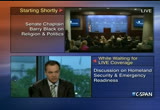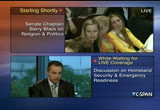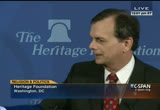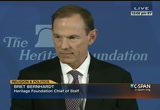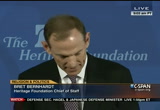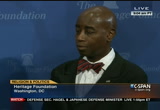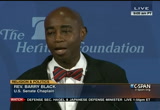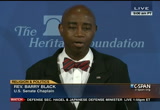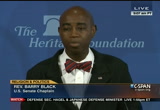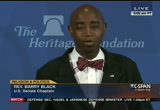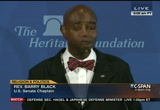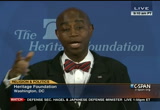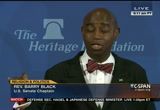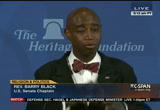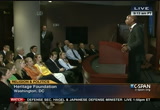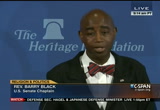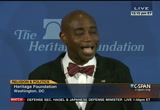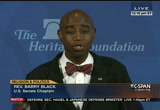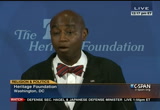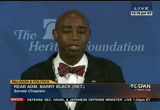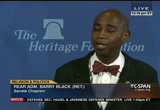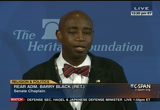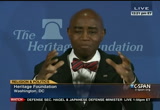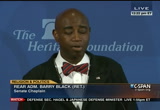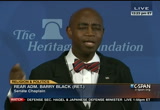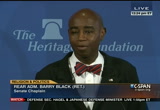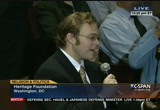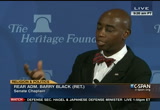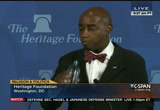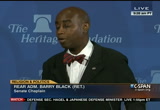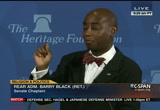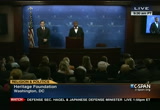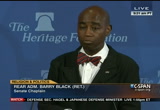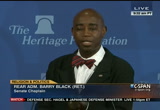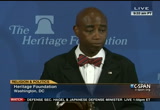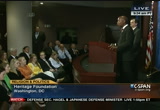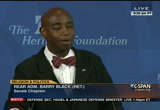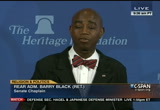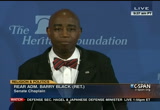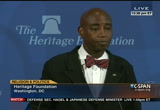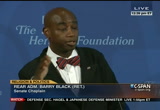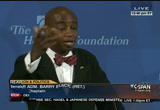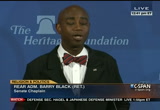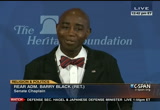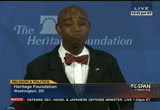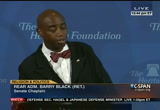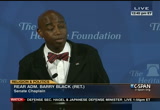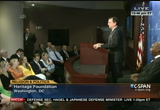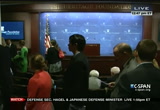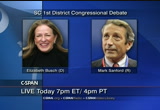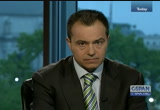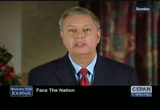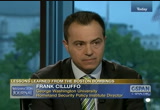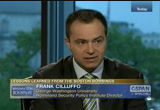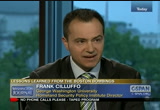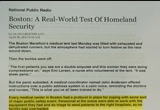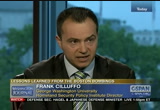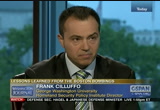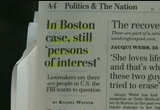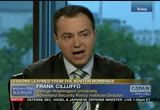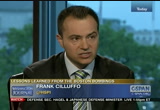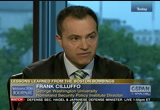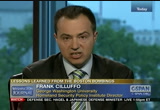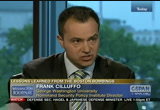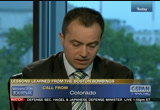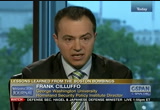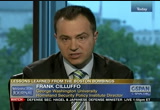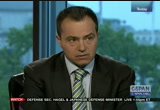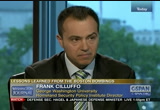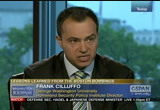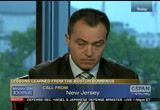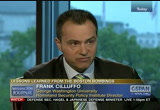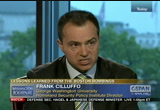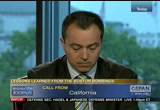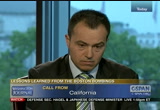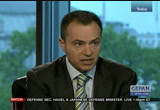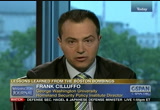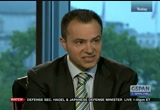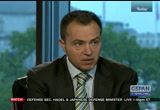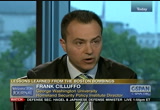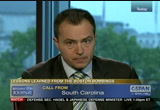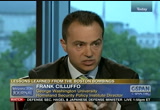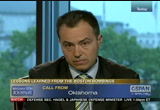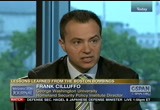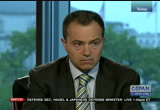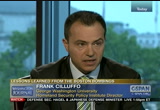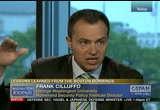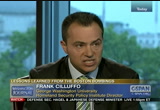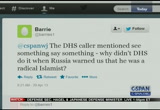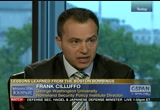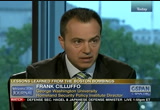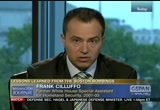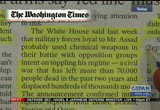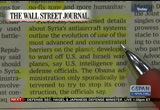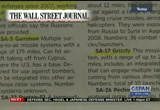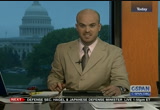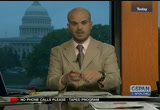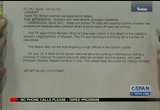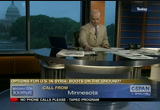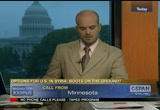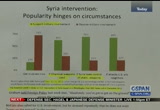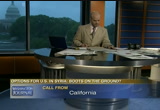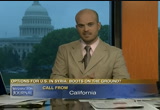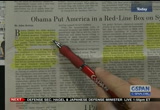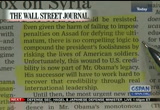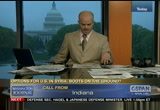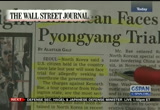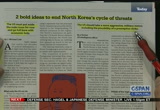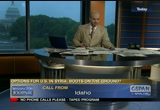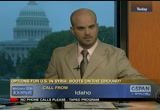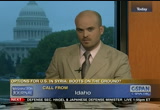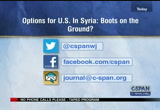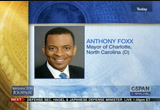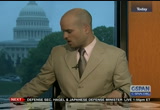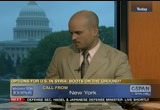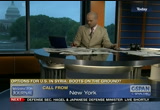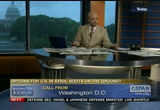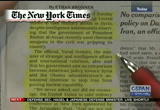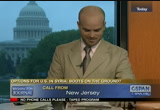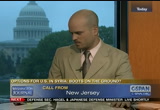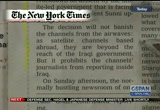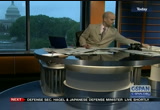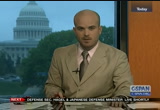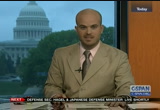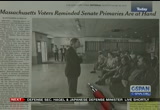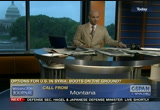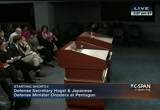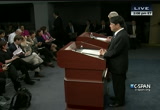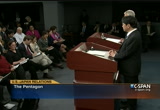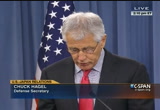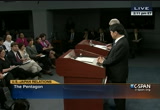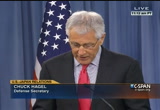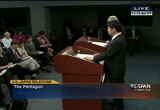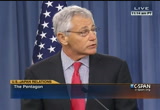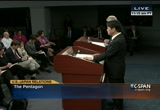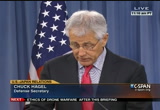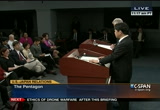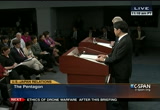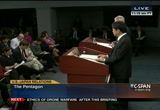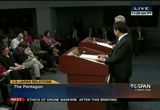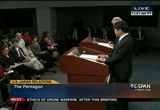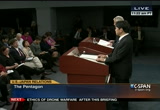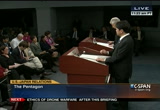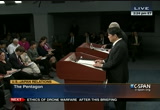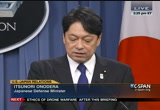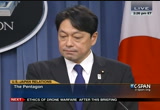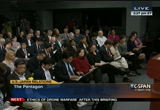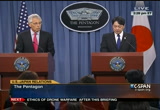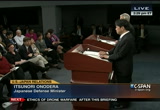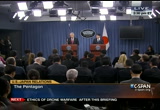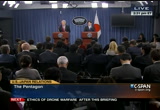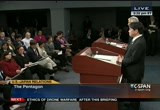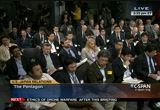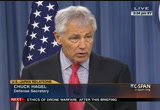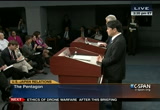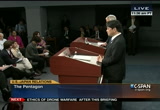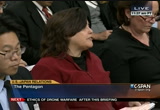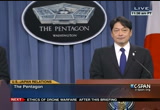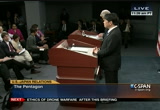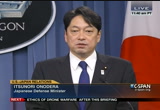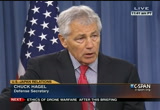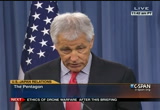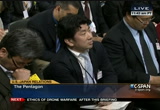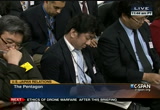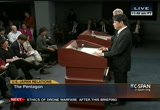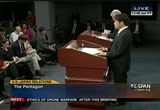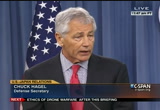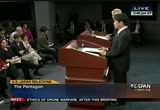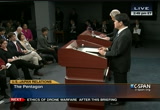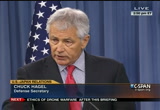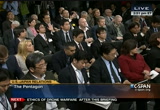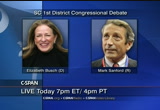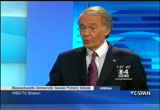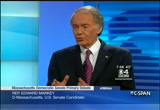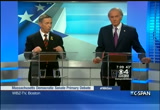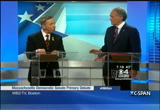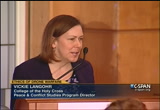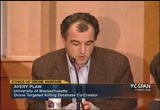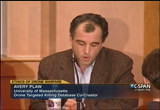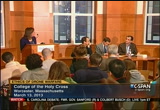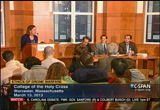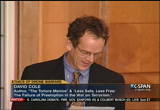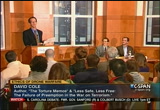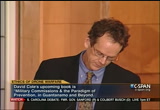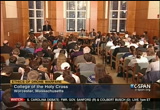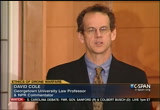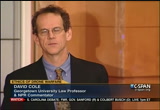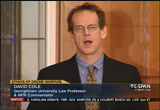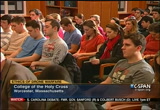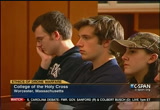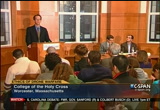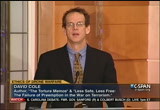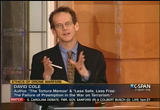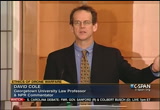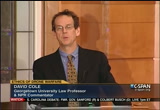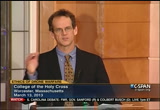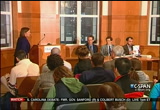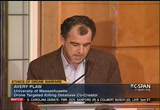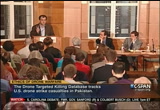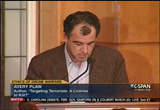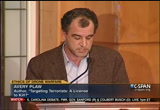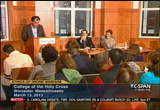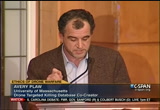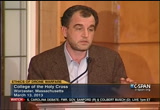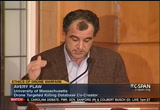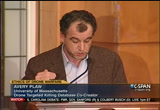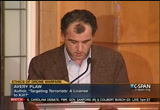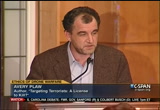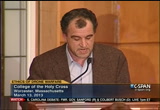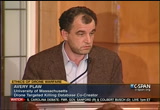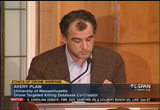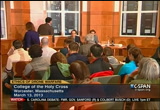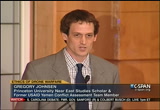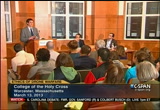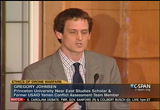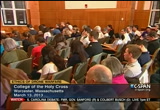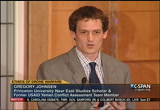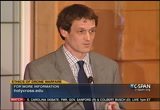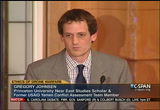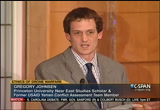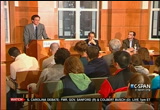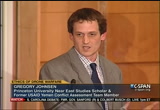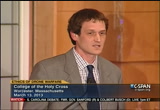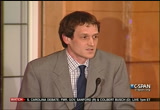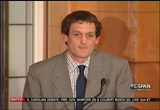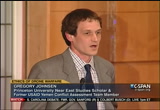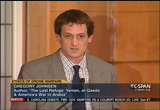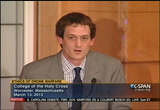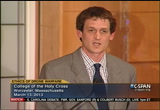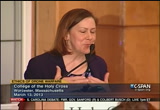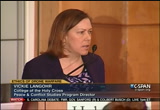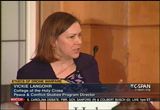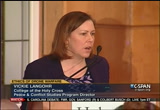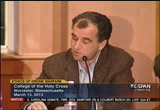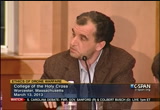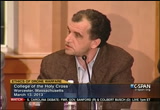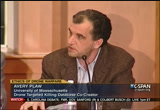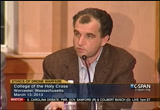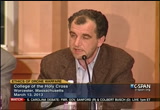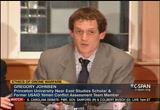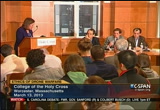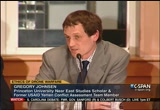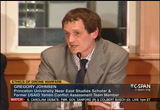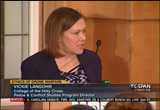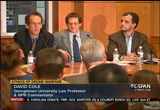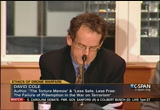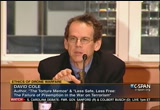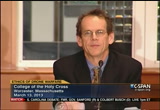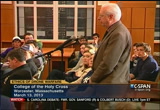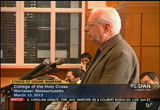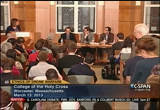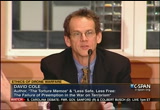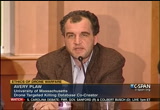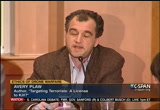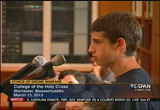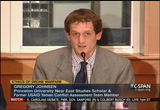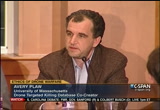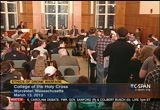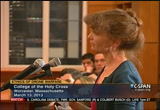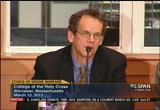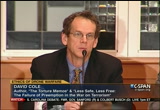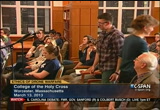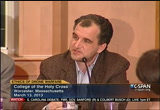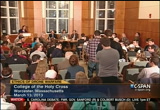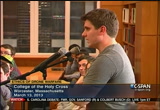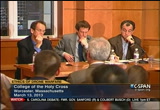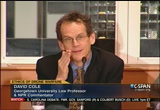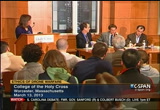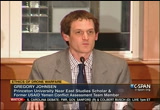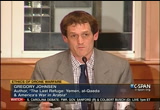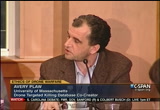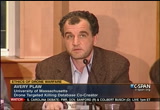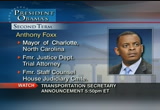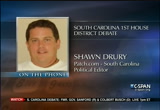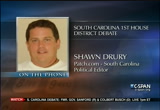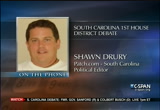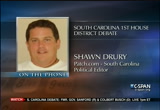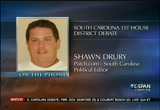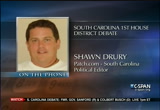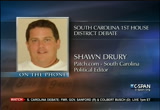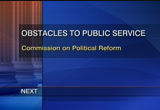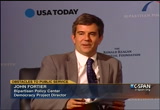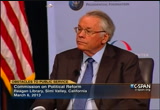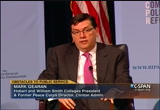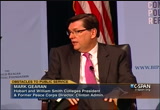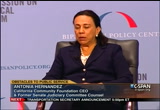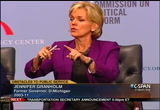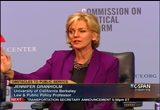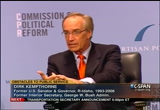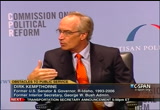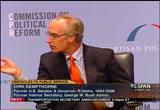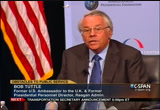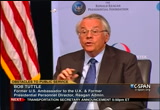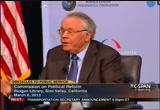tv Public Affairs CSPAN April 29, 2013 12:00pm-5:01pm EDT
12:00 pm
lot of information and a lot of clues hopefully that can put together the entire mosaic of the investigation. host: the senator's comments about stove piping. i want to talk about this issue. here we are 11 and a half years after september 11. is there concern about stove pipes coming back in? your guy who helped build up the homeland security apparatus after the attacks. guest: there is the same prior to 9/11 we had the mantra of need to know and after 9/11 there was the mantra of need to share. the question is, are we sharing the right information. databases themselves are relatively classified or highly classified. so, not sure precisely -- we're hearing in the media the russians provided information and i think they are probably in a a position to share additional information. theyes, i think information sharing environment is always going to be a challenge and it is always
12:01 pm
going to be imperfect. but i think it has improved dramatically since 9/11. host: our guest is a former white house special assistant for homeland security from 2001- 2003. alle, of course, welcome of us who join us on these occasions and on our heritage .org website and those joining on c-span. we would ask everyone here in- house if you would be so kind to see that cell phones are being turned off as we prepare to begin. all of us would appreciate that, especially those recording the event. we will post the program on the heritage homepage within 24 hours for your future reference as well. now, if you would please join me in welcoming our presenters. they will take their place on the stage. gentlemen? [applause] >> thank you, john.
12:02 pm
, chief is bret bernhardt of staff at the heritage foundation, and it is a joy and honor to be here today along with senator demint to present chaplain barry black to the heritage program. having served in the senate as a chief of staff, i can tell you his unique position in the senate, a secular institution. as we look at the topic, bridging the religious and secular divide, it might be thought the intention is to meld the two sides into one. what a perfect analogy but it is helpful to consider what the purpose of the bridges. it does not exist to close the divide, fill the divide or eliminate the divide. the bridge acknowledges the divide. it exists because of the divide. it simply reverses it. the invitation put it well when it said -- it is possible, however, to bridge the divide
12:03 pm
between the secular and religious world, and quite arguably, for the better than of both -- betterment of growth. i can think of no better description of what chaplain barry black does then this invitation description. he is, as the scripture says, the man standing in the gap. as the pastor of the senate he serves as counselor, comfort and friend to many, including myself. rarely a day goes by i did not consider something he has taught in one of the staff bible studies which helped me through a challenging situation. after all, someone who has spent most of his career deployed months at a time as a navy chaplain has plenty of practical advice, let me tell you. the amount, it is my pleasure to introduce senator jim demint, president of the heritage foundation, who will introduce chaplin black. >> thank you, folks. to havet is wonderful
12:04 pm
you here. out of the darkness and into the light here at the heritage foundation. i know, i just came from there myself. chaplin black was commissioned in 1976 as a chaplain in the u.s. navy, and he retired as a 30- admiral after a nearly year career serving as navy chief of chaplains in his last position. he has earned doctorates in both philosophy and ministry. his biography "from the hood to the hill" recounts the story of overcoming unpromising beginnings in the inner city of baltimore. his more recent book "the blessing of adversity -- finding your god-given purpose in life's troubles" distills the wisdom he has gained from 30 years as a counselor, theologian, and psychologist, for addressing the many trials in life. ,arry, we have plenty of those so i appreciate you coming and sharing with us today. [applause]
12:05 pm
>> thank you so much. i am extremely nervous today because members of my staff are here. [laughter] and they are critiquing me. a lady approached me some time ago and said, dr. black, if they permit prayer in the legislative branch of government, why have they removed prayer from our schools? that i wasconfess rather flippant in my response. it was a reflex, and i should have thought through my response a little more carefully. i sit, madam, -- i said, madam, as long as there are final exams there will always be prayer in schools. it demonstrates the fact that
12:06 pm
even in a secular environment, the spiritual is often present. in 1787 at the continental could congress -- at the continental congress, the group reached an impasse when benjamin franklin spoke. and he said "gentlemen, i am an old man. but i have lived long enough to know that if a sparrow cannot ,all without god knowing it that an empire or a republican not rise without his help." and franklin suggested that the group should pray. i think it is an example of bringing the spiritual into a secular environment. that the work of the spiritual is that of the
12:07 pm
minister. and if i were only an ordained clergy person, i could certainly inject some spirituality into my workplace, my work environment. but more of a secular environment. i would challenge that presupposition. i think it is critically important to remember that 90% of the life of jesus was spent in a secular occupation. he was a carpenter. only three years in what we would consider the priest, prophet ministry and outreach. 75% of our biblical heroes and inoines were involved secular occupations. and yet they were able to bring the spiritual into those occupations.
12:08 pm
shadrach, -- abendego -- or as we would say, a bad negro. nehemiah was a cupbearer. so many brought the dimension of the spiritual into a secular environment. joseph was prime minister of egypt. and what an amazing contribution he made, bridging the divide between the sacred and secular. ,s a senator demint mentioned i was in the navy for 27 years. and i was delighted to be and that military organization, because as most of you know, jesus was a navy man. [laughter] ships, walking on water, although some say he was a marine, but i believe he was in the navy.
12:09 pm
exegesis i remember ha a supvisor, second in command, who was an individual that i did not enjoy being with. i must confess. confession is good for the soul. rarely spoke a paragraph without plenty of profanity. and that is rather aggravating for a person of the cloth. well, he was writing my e-mail you a. so what do you do? i would take him on in the evening prayer. on the ship there was a public address system and in the evening the chaplain offers a prayer and a very inclusive .rayer for all of the sailors the executive officer and i were going back and forth, as i would debating him in the prayer
12:10 pm
ande would, of course, after the prayer, as i was leaving the bridge -- with the chaplain please report to the executive office. i would come in. what is wrong, sir? "how dare you talk about me in the prayer." i said, i did not mention names, but i just said god would be offended by the amount of her vanity happening on the, even at the highest level. [laughter] a clever way of bridging the divide between the sacred and the secular. but then a new commanding officer came aboard. he did not wear his religion on his sleeve. he did not even attend the worship services or the bible studies that i conducted on the -- ship.d after two days of wandering around the ship, he had a captain's call -- this is when the new commanding officer he finds a reality for the ship. one of the things he said,
12:11 pm
quoting, was that there would be no profanity aboard his ship. i was startled. no profanity. he quoted george washington who said something about needing to use profanity was an indication of a limited intellect. so, buried was. and i honestly believed that there was no way -- so, there it was. and i honestly believe there was no way the executive officer would be able to speak standard english. the end of his career. no way he would be able to obey this order. this was an der that was too much for him. i have never heard him speak more than a sentence or two without using profanity. but miracle of miracles, all of a sudden the language on that ship waslean. and it was absolutely amazing the difference that it made,
12:12 pm
because an individual -- and i don't know how religious he was -- was able to inject the ethical and the moral into a cur environment. , if you are to you a person of faith, is to find a way to bridge that divide and to recognize that many times to make a dichotomy between the sacred and the secular is incorrect. the lebanese-american apollo it in his wonderful book "the prophet" -- if you have never read it, you should. it is lyrical. a prophet was leaving a town, and they ask him to speak about various things, and speak of love. he said, i am really not a speaker. but whatever -- whenever they would ask him to speak, these
12:13 pm
lyrical soliloquies would follow. one love beckons to you, following, his ways are rd and steep and when the wings of love unfold you, yield to him. the sword hidden him his opinions would wound you. he says your children are not your children, they are the sons of daughters of life longing for itself who come through you but not from you, and though they are with you, they do not belong to you. then finally somaid,peak to us of religion. and he said "have i spoken this day of ouht else?" is not religion albeit an reflection and not -- everything not been an reflection a wonder and a surprise ever springing in the soul? 10:31k first corinthians captures what we should be doing if we are wanting to make sure who who we are as spiritual bein follow us into the workplace. it says -- "whether you eat or
12:14 pm
drink, or whatever you do, the do it all for the glory of god." it is basically challenging us to glorify god in our behavior. whether we are at work, whether arere at home, wherever we and whatever we do, we should strive to glorify god. i want to make just a few suggestions on how to do that. the first suggestion is to be salt and light. now, some of you have heard the great communicator ronald reagan talk about america as a shining city upon a hill. he was actually paraphrasing matthew 5:16 when jesus said you are the light of the world, a city set upon a hill cannot be
12:15 pm
hidden. we ought to be salt and light if we are to glorify god in the workplace. .alt makes food palatable i spent a lot of time in south carolina pastoring the alumnus of the university of south carolina -- at sumter. and anyhow, i cannot imagine grits without salt. i shudder at the thought of grits without salt. your presence in the workplace, bringing who you are as a spiritual building and glorifying god and all you do should make the work lace more palatable. people should not be high- fiving one another when you have a six day. you should, instead, make the workplace a more peasant
12:16 pm
environment. be salt. salt, in the days before refrigeration, also preserved food. and your presence in the workplace, bringing who you are is a spiritual being, should make the workplace a more secure environment. you will recall in genesis 18, abraham interceding for sodom and gomorrah. "god, if there are at least 10 people there, will you spare the city? " :16, says the five effectual and fervent prayers of the righteous and feel much. when you can't do anything else you can always pray. and there is power in your prayer. so, be salt by making the workplace more secure with your intercession. be salt by making the workplace and more palatable place.
12:17 pm
.nd be light, illuminate illuminate. make a difference by the insight thebring based upon knowledge you have of sacred scripture there it -- scripture. many times, you don't give chapter and verse, of coarse, but simply paraphrasing a biblical insight will help you to be a force for good, particularly when in the work rightpeople are facing vs. right conundrums. is is easy to facing right versus wrong conundrums, but right versus right of the most of cocoa salt. that is one of the reasons why we are challenged in th gislative branch, because many of the issues -- not all of them -- but many of the issues debated in the chamber involve
12:18 pm
right versus right conundrum. truth versus loyalty, long-term versus short-term, justice versus mercy. right versus right. the individual versus the community. and you, a person of faith with revelatory knowledge can illuminate that environment. in the same way that joseph was able to give illumination to farrow -- the pharaoh. he was able to give illumination to the buccaneers are -- nebuchadnezzar and latercyrus and -- and later darius and cyrus of the persian empire. second, witness without words. pull offough to because a lot of us are good talkers, but we don't back up
12:19 pm
our talk with our actions. and if you are ethically action shouldr be the key thing you focus on. francis of assisi said preach the gospel everywhere you go. when necessary, use words. for good in the workplace, can make a difference without saying anythingp. paul put it this way in second corinthians -- you are a living letter to be read by all who see you. a living letter. edgar guest put it another way -- saying i would rather see your sermon than hear it any day. i would rather you walk with me then to really -- merely tell the way. the eyes are better pupils and more willing than the years.
12:20 pm
find counsel is confusing, but example always clear. and best of all, the teachers are the ones who lived their creed. to see good put in action is what everybody needs. i soon can learn to do it. if you let me see it done, i can .atch your hands in action b and the lectures you deliver may be ever wise and true, but i would rather get my message i observing what you do. .itnessithout w fi, if you are going to bridge that divide between the live tond the secular, serve. your focus should be about servant labor or servant
12:21 pm
leadership. max dupree wrote a wonderful book, and in the book he said there are three responsibilities of leadership. the first is to define reality. the leader projects division for those who are working in a particular organization. the last responsibility of a there is for making sure is an orderly transition from retirementtion to or wherever the person is going after he or she leaves. to say goodbye in a dignified way. that is why in the navy we have what we call hail and farewell and you have to be at the hail ven though you did notodbyes, to particularly care for them. but in between, says dupree, the leader is a servant. how can i serve question mark and it is this proclivity for service -- how can i serve?
12:22 pm
and it is this proclivity for service that should make all the difference in the world. are you a servant? paul put it this way in first corinthians chapter 4 -- eight of yourself as a servant and steward of the mysteries of god. am i serving? one of the last two speeches made -- actually it was a sermon, but it was made by martin king, the last servant -- sermon he preached, he talked about what he wanted said at his funeral. he said if any of you were around, when it comes my time to meet my day, i want a long funeral. get somebody to deliver the eulogy and tell them not to talk too long, not to mention i won a new bell -- nobel peace prize, not to mention the 300 or 400 other awards. i wentolm not to mention where i wa sebto be ab tle say in that day that
12:23 pm
martin luther king, junior, tried to give his life serving others. i want them to be able to say that martin luther king, junior, tried to love somebody. i want them to be able to say that i did try to feed the hungry, to clothe the naked, to visit those who were in prison. i want to -- then tuesday i tried to be right on the war question -- i want them to be able to say i tried to be right on the war question. i want them to be able to say i tried to love and serve humanity. he ended, as every baptist preacher has to do, with a little bit of lyrical intimation -- we call it whooping in my tradition. i don't want to frighten anybody. yes, if you must say i was a drum major, say that i was a drum major for justice. to say that i was a drum major for truth. say that i was a drum major for righteousness.
12:24 pm
and all of the other shallow things of life would not matter. i won't have any money to leave behind, he said. i won't have any of the fine luxurious things of life to leave behind. but i just want to leave a committed life behind. and that is what each of us can do if we will bridge the divide between the sacred and the secular. if we are salt and light wherever we are, if we witness with our words, and if we live to serve, then the words of the hymn writer will become true. if i can help just one somebody as i pass along, then my living shall not be in vain. god love you. [applause]
12:25 pm
>> do you think we can arrange for this every monday at noon? we will be glad to take questions. we have a microphone. and if you would be so kind to introduce yourself and make your question in the form of a question, we would be happy to recognize you. down here in the front. >> thank you so much, chaplain black eared your words inspired us. i would like to ask, in light breitbartevents, spoke about tapping a christian really just extremist -- and on top of that, the push to make
12:26 pm
military chaplains accept the gay marriage and push that in the military environment. how do you see a committed christian being able to stand up against things that might be considered religious persecution in the united states and in politics today question might >> -- politics today? >> the military has a religious accommodation policy that you would have to eliminate to pull it off. the religious accommodation directives make it clear that a clergy person cannot be forced to do anything that he or she is not comfortable with doctrinally. military chaplains serve in a context called institutional duality. they are endorsed by a church, so they receive an ecclesiastical endorsement as well as being commissioned by
12:27 pm
the military. and a withdrawal of an ecclesiastical endorsement would remove the chaplain from his position as a chaplain. so, there are safeguards right now that would have to be removed. i can see many military chaplains having some problems because to preach the passages of paul with exegetical integrity would mean being accused of engaging in hate speech. that is is a challenge think we are going to have to deal with going forward. >> yes eared right here. -- yes. right here. >> when you talk about being salt and light and witnessing without words, you talk about christians eating more of a quiet witness. but i wonder, when is it
12:28 pm
appropriate for crittenden -- christians to be more of a loud witnessed? things like protests, boycotts. the civil rights movement or today, abortion protests or boycotting certain companies and things like that. how should christians decide when to be a quiet witness versus when it is appropriate to be loud? >> well, aristotle wrote a marvelous book called "the rhetoric was quote and he said to persuade you need a tripod of threes things. he used greek word. ethos, pathos and -- ethos is being perceived as ethically congruent. that is what witnessing without words is all about. the problem is, we are often loud before we have the prelude of the silent witness of our integrity and of our sensitivity, particularly to the marginalized.
12:29 pm
so, i think, yes, there is a time for a louder witness. by ahat should be preceded lot of loving, a lot of serving. the civil rights movement was actually a great example of witnessing without words. -- i participated. i was in alabama in the 1960s at the segregated lunch counters and i sat in the audience listening to martin luther king speak. we put our bodies on the line without making speeches. martin was our spokesperson. but when we faced the billy club of the police officers and the police dogs, we did not say a word, and yet aroused the conscience of a nation without words. so, i think there is a time for louder witness. but someone said, what you do
12:30 pm
speaks so loudly i can't hear what you say. we will come right there first. sorry. working my way around. >> iq so much. i -- thank you so much. i am an intern at heritage. i am curious what you think -- there seems to be -- to go back to aristotle, for a second. politics is supposed to be about justice. and society's understanding of justice seems to have been shifting over the last couple of years, maybe longer i'm away from the idea of justice that is understood by people of faith come up particularly the christian faith. now we see conflicts arising come up people say my conscience be clued from paying for this kind of procedure and insurance and the hhs mandate says justice as defined by the
12:31 pm
politics of the country requires you to pay for this. at what point does there be, a separation between that secular finition of justice and the lifi osut the people on that religious side start to become excluded from political participation? and how do you prevent that sort of thing from happening? >> well, i think jesus' statement rendered to season things that are caesar's d god things that are gods, that is a critical part when you when you are wrestling with issues like that. personhink also that a has to have sufficient integrity where there are lines you will not cross. and you have to have the , nicee -- like shadrach catch, and a bendigo -- and
12:32 pm
abendego. do this or burn. my god will be able to deliver us. he will deliver us. even if he does not -- and they are talking to the king -- we would rather bow than burn. we do not know where daniel was at that time. we hope he was out of the country. in daniel chapter six, we see daniel go into the lions den rather than obeying an unjust law. the whole civil rights movement was based upon this notion of disobeying unjust laws. that is what gandhi did. so, we have a history of nonviolent direct action, and we certainly have enough evil -- enough people of faith that there are creative ways we can tackle any challenge we face. but we have to be a lot more creative in that approach. team effort.
12:33 pm
the harvest is white and the laborers are few. what do you do? pray that the lorvest will sendh laborers. --need more neighbors laborers to help them in the challenging situation. have the line that you will not cross. it does not take a lot of folks to make a difference. it really does not. 7:14 -- if my people who call my name humble themselves and pray, then i will eared them -- heal them, forgive their sins and heal their land. a powerful force that knows how to speed dial seven. heaven -- speed dial heaven. >> i was interested in your understanding -- i was also curious if you got any instruction about this when you
12:34 pm
started your position for the u.s. government. the origins of prayer and the congress. my understanding was that really was started by benjamin franklin who, i believe he did have various religious beliefs throughout his life. at the time he proposed that, it seems to me he was probably a deist. was not someone who believed in the same god that i believe in as a christian. i am wondering, how do you see prayer and how was it proposed to you to be used in congress? it is one thing i'm a bit -- it is one thing, a prayer for a christian or a believer in another religion or someone who may be nominal in the faith or someone agnostic, atheist, or deist. >> franklin was, in 1787, at the continental congress but prayer came to the congress in 1789.
12:35 pm
interesting enough, it came three days before the stabbing smith clause of the first amendment. congress shall make no law respecting the establishment of religion or prohibiting the free exercise thereof. on the day the establishment clause was proposed, there was a prayer. and there has, for the most part, been uninterrupted prayer since 1789. ofhink franklin's notion needing contact with the transcendent is at the foundation of this whole notion of prayer. --enjoined in first thessalonians to pray without ceasing. we should always be in an attitude of prayer. but if there is any place on the planet where prayer is needed, it is capitol hill. ok? [laughter] that the basic -- it happened in 1789.
12:36 pm
the basic thrust was we need to be connected with the transcendent. i think prayer makes a difference. it really does. the effectual fervent prayer of the righteous avails much. >> chaplin john hamill -- chaplain john hamill. since you are a daniel in the congress -- >> and the lions den. , we are praying for you. -- >> we are praying for you. i would love to see a few examples where you have seen the hand of god move in congress related to your intercession? >> well, when i first arrived in the senate in 2003 i had a lady who came to me and asked me to pray for her because she had been diagnosed with inoperable cancer. we have a prayer team of several thousand people. and we just give the first name and what the problem is.
12:37 pm
i encountered this lady three or four months later and she was smiling. she had begun to feel so good that she had gone back to her "if this isd said dying, it's not too bad." he brought in all these experts and, bottom line, could find no evidence of cancer at all. --nded up eight years later she was 90 -- delivering the eulogy at her funeral. she died, but not of cancer. she died of something else. so, an example, i believe of james 5:17, if there be any sick among you, pray. debtconvinced that ceiling -- debt feeling prayers, sequester prayers -- we stay on our knees. time and timegain, sometimes
12:38 pm
at t 11th hour we have seen god stepped in and make a difference. i have had senators say to me, chaplain, something you said in the prayer caused me to change my vote. i don't know what it was, but i am sure the holy spirit has a way of touching hearts. it probably was something i did not intend to be directed -- but god has a sense of humor. so, that is a good book to read -- but time did not permit me to tell you the many, many times i have seen prayer answered in the u.s. senate. >> [indiscernible]
12:39 pm
their parents are hindu and sikh. their parents wanted their own god on capitol hill. how would you react? muslim might have their own demand. how would you reconcile so many religions and so many kinds of prayers and then having at some point -- some have more than one god and statues -- representing god on capitol hill. thanks. ari -- a famous roman catholic writer tells the story of exodus and the children of israel going through the red sea. of course, they go across on dry land. and when the pharaoh tries to
12:40 pm
follow, the waters, and the army is drowned. the angels in heaven are looking -- in his writing -- and tears are coming down the faith of god. the angel said, god, why are you crying? your children, the israelites, had just been freed from egyptian slavery, for centuries of slavery. god responds -- yes, but my children the egyptians are dying. godink our eorts to put in a box and to define the transcendent -- we are like children building sand castles. and we've inc. -- i think we will discover there is a greater unity of divinity that surrounds the planet than we realize. call him by -- whatever name you want to call them. i believe he has the whole world
12:41 pm
in his hands. >> in the back. congressman walter jones has been introdu bil afor years to let military chaplains and a prayer -- and prayers are broad with "in jesus' name." can you gauge the morale of broad and give your opinion? >> i spent 27 years in the navy -- based rock -- retired two star admiral. i have prayed during that 27 year ministry thousands of times in the name of jesus. am a fileip service -- in the worship service, bible studies, when i am ministering to the sick. military chaplains on a daily basis pray in the name of jesus. but because we are in a pluralistic environment of ministry, there are times when a
12:42 pm
more inclusive prayer should be prayed. for instance, three marines have been killed, two of them are muslim. for me to pray christ-centered prayer would probably be inappropriate, would probably not be best peered would not say inappropriate. or when i am praying over the one -- i have hind and i am facilitating for them and i pray a prayer -- you are on the ship, there is no way you can -- well, you can jump overboard, but you have to hear the prayer and there is nowhere for you to hide. for me to pray in the mighty name of jesus, that name that is above every name, would probably be a little over-the- top. so, the times when military chaplains cannot write in the name of jesus, in my opinion, from my experience, those were
12:43 pm
few and far between. i do it hundreds of times. i baptized folks, the whole nine yards. and then i talked about religious accommodation. if a chaplain comes from a religious tradition where he or she says, you know, if i don't say that name, it is not a prayer. you say, fine. ok. we will get someone else to say the prayer for this particular venue. no problem at all. even as there are some chaplains who sprinkle and others, of course, correctly, immersed -- just joking. i knew senator demint was here, so i had to throw it in. some baptize babies. no problem. if you are not comfortable with that, we will get someone else to do that. what, you know, you can stay committed to your conscience and follow it. i don't see it as a serious problem. from my perspective of 27 years
12:44 pm
of labor in the military. , amy name is antonio chavez science teacher. american "the moxie of -- "democracy in america" tocqueville said religion was essential to american democracy because he thought democracy would release selfish instincts and religion would keep those instincts in check. when you look at what is happening in europe, what do you think about that? >> there is debate about whether or not alexis de tocqueville actually said that and also debate about the famous quote, america is strong because america is good, when america ceases to be good, america will cease to be strong. however, if he did not say it, he should have said it. it is basically a paraphrase of 14:34 -- righteousness
12:45 pm
exalts a nation but sin is a reproach to any people -- proverbs 14:34. sin is an equal opportunity destroyer. it does not care your name is america. and if you look at empires that have imploded -- babylon, alexander the great in greece, rome -- "decline and fall of the roman empire." you know, sin can destroy. i think people of faith should recognize the contribution they make to the national security. . talked about genesis 18 abraham negotiating for the survival of sodom and gomorrah. he started up around 35 and winnowed down to 10 -- he figured there got to be at least 10 righteous folk in the whole town.
12:46 pm
after all, you've got lot, he's got daughters, a wife. if he is doing any kind of work -- could not even find 10. so, i believe alexis to tocqueville is on target that we do need to appreciate goodness, celebrate goodness, and be willing to die for goodness because it is a national security issue. >> one more. >> anyone from my staff? [laughter] >> if not, thank you very much. >> thank you. [applause] >> we do, of course, have copies of both of his books available if you would like to have them signed by chaplain black. while i do have the podium, i want to thank you for your
12:47 pm
service to the nation during your career in the navy. thank you for your service to the senate where we know they need as much help as they can get. tank you for your wonderful example. you have an open and dictation to come visit us anytime. tank you, and thank you all. -- you have an open invitation to come visit us anytime. thank you, and thank you all. [applause] >> wonderful. >> thank you, sir. [captioning performed by national captioning institute] [captions copyright national cable satellite corp. 2013] >> we have more live coverage coming up this afternoon here on
12:48 pm
c-span. an hour -- just over from now, defense secretary chuck hagel will have a joint press conference with the japanese defense minister after their meeting taking place at the pentagon. .ive at 1:55 eastern at the white house this afternoon, president obama is expected to announce his choice of charlotte north carolina mayor anthony foxx to be the next transportation secretary. if confirmed, he will be placed outgoing secretary ray lahood. we will have the personal announcement live starting at 2:10 eastern on our companion network c-span3. at 7:00 p.m., the debate for the first congressional seat in south carolina. former republican governor mark sanford and elizabeth bush -- busch. it is expected to focus on federal expending, gun legislation and a number of other key issues. are trying to generate
12:49 pm
as a government and you are looking for ways to generate new revenue, silicon valley has the answers. if you are trying to explore and ignite better innovation within your mpany's, silicon valley has the answers. and then from an entrepreneur standpoint, how is entrepreneurship different than in other places, which is distinctly is? so much is often based on failure and learning from one's experiences. but it is also recognizing that you can be part of the process of adopting other peoples ideas or you may have the idea for for the next big thing. but the bottom line is, there is an authenticity to the way things are done in silicon valley that is very accepted, no matter who you are. >> what makes silicon valley tech? tonight on "the communicators" at 8:00 p.m. eastern on c-span two. she married at the age of 16 and help teach her husband to be a better reader and writer.
12:50 pm
during the civil war she sneaks supplies to the unionists and the tennessee mountains, but by the time her husband assumes the presidency, she is in poor health and seclude yourself to a second-floor room in the white house. meet the wife of the 17th president andrew johnson as we continue our series on first ladies with your questions and comments by phone, facebook, and twitter. tonight, live at nine :00 p.m. eastern on c-span and c-span3, also on c-span radio and www.c- span.org. >> and look now at homeland security's involvement in the boston marathon bombing investigation. on this morning's "washington journal." >> law-enforcement officials continue studying the incident. we are joined by a former white house special assistant for homeland security and di rectorof the george washington university's homeland security policy institute to discuss these issues. sundaydiscussion on the
12:51 pm
shows yesterday over whether the u.s. information system failed leading up to this incident. we want tolay a clip of lindsey gramm is today, senator lindsay gramm on the "face the nation." [video clip] >> the fbi investigated the obama brother but never shared -- the older brother but never shared the information with the people in boston. when he goes back to russia in january 2012 the da test does not share the information -- hee dhs does not share the creates a you to the channel with. it is a failure to share information. these obvious warning signs -- -- missing obvious warning signs.
12:52 pm
we are going back to the pre- 9/11 stillyping. host: yourhoughts on information sharing? caller: it is always a challenge among state and federal authorities. it is early two 0.2 far into what was and was not shared. we do know that his information was untied. which is a big database. it is a watch list of sorts but that is not the formal name. as to whether or not that information was fully tapped, utilize, and extrapolate it is the real question here. i think the six months traveling overseas in russia is where you are quantified a lot of information and clues that and hopefully put together the entire mosaic of the investigation. >> host: i want to talk about the issue of still piping. here we are after 9/11. is there a concern about steel
12:53 pm
pipes coming back in? your friend helped build up the home as security apparatus after the attack. guest: prior to 1911 we had a lot of need to know. thequestion is are sharing right information? relativelyes are classified. we're not sure precisely what we are seeing in the media. that the russians had provided informatio and they're probably in a good position --we believe they are in a good position to share additional information. i think the information sharing environment is always going to be a challenge. it is always going to be imperfect. i think it has improved dramatically since 9/11. host: frank cilluffo was a former white house special assistant for homeland security from 2001 to 2003. talk more about the russian connection here and our ability to cooperate with them in this investigation.
12:54 pm
thet: that is going to be key. we have a unique opportunity to work closely with the russians who historically have not been very good friends in a number of national security matters. i think this is a turning point. i think this is an opportunity to facilitate a liaison between the two countries. obviously russia has the better read on some of the jihadi and extremist organizations in chechnya. i think they in fact will have some meaningful information and that they are willing to share that with our liaison intelligence services and specifically the fbi. ironically i still work on a russian organized crime cases in the 1990's. it was very difficult to get information from the russians. every once in awhile to will flood the system with information. they have a signal to noise challenge. it was that you cannot make heads or tails out of the information that was actually being shared. i do think there is a unique
12:55 pm
opportunity here and i hope that the russians live up to their partnership here. i do think time will tell. howthis is a unique opportunity. host: we are taking your calls and comments in this segment. if you want to talk to frank cilluffo, currently he is the director of the hamas security --icy institute at george the homeland security policy institute at george washington university. the numbers are on the screen now. we wanted to get to the headline from "national public radio," -- we talked about the intelligence leading up to this incident. talk about the reaction and how would you grade the homeland security response from the incident forward? guest: prevention issues aside, whether or not he should have been on the radar screen, the response was incredibly powerful.
12:56 pm
here you had ems sprung to action immediately. you had the medical response that was robust. the tree of was very effective. effective. triage was very effective. it was nothing short of -- theit was nothing short of terrific. you have to rampi also think in the unfolding of up. the offense the boston police department is now the gold standard. they set the bar for how to communicate with social media. they were dispelling myths and false information. athink if you were to look it from the first responder perspective, and also good american citizens, cannot help but say that was an a-plus. lives were saved because of some of that training and some
12:57 pm
of that exercise and we saw come into play. peopleou talk about the who were on the scene to were not officially first responders, the price standards. -- the bystanders. talk about how their reaction has changed in a post 9/11 world. guest: we talk about resilience and we want to build up a resilience community that can absorb unfortunate crises because both from a first response standpoint but we do not want to live our lives in fear, obviously. what you're seeing is the government has improved its capacities incredibly since 9/11 but we will never be in a position to protect everything, everywhere, all the time, from every perpetrator. we have to minimize the risk but we will never be at 100% securities. i do not want to live in a society that is 100% secure because that would mean real draconian steps that are being taken.
12:58 pm
what you want to be able to do is focus on the real perpetrators and real bad guys. he wants to be able to improve your intelligence capacity to get the bomb before it goes off. it is worth noting that there have been 65 + plots since 9/11 that have been prevented. we are never quite get to that point where we are 100%. what we want to do is minimize the risk and make it more difficult for the adversary to commit acts of terrorism. the: the boston case was subject of the sunday shows. we want to -- a bit more from the "washington post" story -- a democrat from maryland told
12:59 pm
abc news, according to the story, there is a person's of interest. mike mccall discussed the role of trainers. what you know about the ongoing investigation and connections overseas? host: it is two reports that was looking at internet facilitated back and go -- internet- facilitated radical organization. obviously when you look at someone who has been trained that is a much more significant threat. it is certainly within the realm of possibility from a tradecraft standpoint that this was straight out of a magazine.
1:00 pm
i do think the tradecraft is a little more sophisticated, especially the destination in -- the detonation device, which is not out of the magazine. the internet plays a role in facilitating radicalization, where you have those inspiring. you hear about people of interest. you are looking for two primary actors, one who is radicalizing these individuals, and two did they receive any training to eat a lot enforcement and to make more deadly devices? -- to invade law enforcement and to make more deadly devices? the two cases, the man who is traveling to afghanistan and wishing to join up with the caliban, -- with teh taliban. -- instead of fighting over
1:01 pm
here, go back to the united states where you are quick to be of greater value because you are familiar with the environment. you have a: passport, the ability to travel freely in the united states. that is a big concern. we have over 500 europeans fighting in syria. at some point these people go back home. we have americans fighting in syria. we have americans fighting in yemen. somalia. that is a concern and something we need to take very seriously. as much as you can learn at home with experts training you, elevates the threat level by many orders of magnitude. host: we are taking your calls on lessons learned.
1:02 pm
we are talking to frank cilluffo this morning. he is the head of the homeland security policy institute at george washington university. george is on with mr. cilluffo. caller: i keep hearing about homeland security. who do they plan on using the ammunition on? guest: i don't have all the facts on the purchase of ammunition, but i do think it is a legitimate question. lawis the second-largest enforcement agency, so they -- all law-enforcement agencies are looking to ammunition to be able to defend themselves. but there are some legitimate questions i don't have the answer to, unfortunately.
1:03 pm
host: another headline from npr -- talk about the decision to the institute a lockdown in the man and. -- in this manhunt. how is it being viewed in retrospect? guest: i don't love the term lockdown. it was a shelter in place that was actually instituted in this case. the scale and scope of this was extraordinary. you had an entire city, but the circumstances were extraordinary. you had an active ongoing very dangerous situation. the so-called lockdown or shelter in place protocol has been in place for natural disasters. they have been in place for an active shooter types of situations. basically, it is too dangerous to evacuate, they institute a shelter in place. host: and i think to this level? guest: this is unprecedented, but so were the circumstances. you had two individuals on the los who had just perpetrated a major terrorist attacks and had
1:04 pm
shootouts with law-enforcement and they were throwing ied's from their car. situation. i think what you saw was a decision made by local officials. i have been quoted many times saying it was prudent. i think in this situation it was. not only do you keep people out of harm's way, you keep people out of law enforcement's way to able to finish off the investigation and identify and catch the perpetrators. host: we are taking your thoughts on lessons learned after the boston bombings. in sterling, colorado, tim on our independent line. caller: good morning. theve a comment about all past government stuff that has been allowed to go on in the u.s., whether that has any part of being responsible for the
1:05 pm
things that are going on in the u.s. with the american people being killed. host: what you mean when you say past things? caller: bailout stuff to go on. a lot of the people would come into this country and go back out. and homeland security being breached by them going back over and learning things about bombs and on the internet and all this stuff. guest: i think one of the greatest dimensions missing right now in our counterterrorism is the push back on the radiology. -- on the ideology. to paraphrase bill clinton, "it's not the economy but the ideologies." right here i think we have had major successes overseas going after the leadership of al qaeda, its affiliates, and its franchisees. and we need to continue to turn
1:06 pm
to the kinetic responses to those terrorists leadership. but we have not done enough to go after the etiology, to expose-- we have not done enough to go after the ideologies. we should dissected and remember the victims. we should really be focusing on the victims, their dreams, their opportunities lost. i think there's much more we can do to expose the hypocrisy and ultimately defeat and attack the ideologies. that's where the which may be dead with osama bin laden or anwar al-aulaqi or some of these other significant actors, which is not trivial. but there narrative lives on and we have to expose that and attack it. host: a question on twitter --
1:07 pm
guest: no. the terminology weapons of mass destruction is chemical biological, nuclear. the legal effect is that it causes mass harm. i do feel the statute, the laws we're going after, yes, this was a weapon of mass destruction. it was not necessarily the way most people think of as chemical, biological, radiological, nuclear, but it caused mass harm, killed a number of people, and injured so many more. so in terms of how we prosecutor in the statutes, yes, i feel that's appropriate. host: are these the threats that homeland security will after look at where the future, conventional explosives as opposed to chemical or nuclear explosives? does this sort of change what they will be looking for? guest: you have always had to look at a whole spectrum of potential weapons.
1:08 pm
obviously, you are most concerned about a nuclear, chemical, or biological warfare agent, because that can have catastrophic effects. likelihood may not be as high. the ability to build some of these weapons and ultimately use them and deploy them requires a much higher level of sophistication, but at the same time you look for the worst-case scenario, which may not have great likelihood, but the consequences are so great, or the higher likelihood events where the consequences may not be as significant, but, as we all know, even conventional explosives can cause a lot of harm. we did make it harder, for example, for people to build huge weapons, fertilizer, for example. there are trigger point where someone were to try to acquire plastic explosives or fertilizer types of weapons, that law enforcement would be tipped off.
1:09 pm
in a way, it pushed off some of the higher scale threats where you were not able to monitor all sorts of black powder or other sorts of devices that are being used. we will have to defend against both. at the end of the day, there are capabilities we have seen overseas with the department of defense. jaida. this is a group that's been following the improvised explosive device networks of al bayda, the taliban, and other insurgents overseas. we need to learn some of those lessons that we of seen in battlefield situations there, translate that domestically. the bomb has always been the but we need to also start
1:10 pm
worrying about computer network attacks, cyber attack. obviously, we can never take our eye off the ball in terms of weapons of mass destruction, especially with state sponsors. countries like north korea and the government of iran and its proxies', that is not something we can ignore. at the same time, that is not the only thing we can afford to focus on. host: we're talking about lessons learned since the boston bombings with frank cilluffo, the director of the homeland security policy institute at george washington university. oura kearny, new jersey on independent line. good morning. caller: good morning. i was wondering, down here for the last couple months there have been psa's for sheltering in in place. i was concerned police cannot cast the second suspect in boston. the public will be in doris -- indoors where they cannot witness anything. i wonder if the gentleman can comment on the safest of
1:11 pm
homeland security and because we are not allowed to enforce our immigration laws that are on the books and we have millions of unvetted aliens here that are more of a risk to us than anything overseas. host: a couple questions for you. guest: the shelter in place, and is an important one. these articles that have been in place for natural disasters, chemical or radiological types of situations, either natural or hostile, as well as active shooter types of situations. so these decisions should never be made by the federal government. it should be made by the local officials who are closest to the scene and ultimately local officials, because this is a political decision that has to be made. host: when is a protocols, this was something of the boston police had worked out for themselves, not a decision to
1:12 pm
federal authorities made? guest: as far as i know, and it should not be a federal decision. this is something ultimately a political officials -- that's why you elect your local officials. they are elected to make some difficult situations. the you saw here was overriding concern a public safety first. that's the number-one priority. unfortunately, there will be other situations where that is in place. alternately, those are local decisions that are being made. and i think they ought to be trained. you've got to think about some of these situations. the time to begin thinking about this is not when something bad happens and the balloon goes up. you wanted able to think about this well in advance. the role the general public place is very interesting. as the caller stated, it was an alert individual that ultimately pulled the thread to identify the suspect. host: he found his boat bloody.
1:13 pm
guest: something amiss. host: he found that in his backyard. guest: yes, when he went outside to have a cigarette. after the lockdown was lifted. this individual played a key role and immediately called boston police and then we have the individual arrested. host: let's go to rebecca from laguna nigel, california, on our independent line. good morning. caller: good morning. i'm a dhhs employee. i worked in emigrations. i'm using an alias to protect my privacy. if you see something and say something, the public really does not know about it.
1:14 pm
these two individuals were actually american citizens. in my opinion, american citizens ourselves can be our greatest threat because we're not suspicious. these individuals were naturalized at very young ages where background checks were not needed to be conducted. if they were, nothing would come up. you are talking about an officer having 15 seconds to them, vet that it is an authentic document and then checking the system. it shows how needed these employees are and how much money to allocate money for that so they can do their jobs and not feel rushed or pressured to make sure the person coming back
1:15 pm
into the country, regardless if they are permanent resident, immigrant, non-immigrant, or otherwise, doesn't have any pings in the different systems that they check and that they are safe to enter the country against. guest: rebekah, i think you bring up a number of points. one thing i would like to clarify is that tamerlan had not received his citizenship in the united states. oft is an area that is interest, because he had applied and had not been given the full green light. his younger brother was. ironically, in a twisted kind of way, he was granted citizenship on the anniversary of 9/11. i think that you raised some big points, but the bigger point is some of the cbp officers, they have prevented a major terrorist incident, a millennium
1:16 pm
plot, well before 9/11, where there was an alert order agent who saw something out of place, some suspicious activity, and prevented a major terrorist attack on the united states in seattle and los angeles. so i do think that you raise a significant point. i think we need to build up the education and intelligence awareness of our border protection and beyond. gothe end of the day, we've to invest in our people. it's not going to be a technological solution alone. here you saw an alert citizen identify dzhokhar tsarnaev. in previous cases we have seen federal authorities who have had years of experience be able to prevent incidents.
1:17 pm
and sometimes it is just getting -- it is improving your likelihood of luck. withmay have been the case the millennium bomber before 2000. host: this person brings up the campaign. if you see something, say something. if you want to read on that. robertuestion from samson on twitter -- if you could talk a little about that. guest: i have heard no one from boston complain. i have heard nothing but the opposite. if you were going to do a survey, i think the people of boston not only for their own safety acknowledged and recognize that was a smart decision to be made.
1:18 pm
so i am not familiar. second- a lot of people guessing from washington and elsewhere. but at the end of the day these are local decisions. i think the local community and the people of boston supported the efforts of boston pd and others to protect them for their own public safety. host: we can put up the fourth amendment of the u.s. constitution, the right of the people to be secure in their persons, houses -- papers and effects against unreasonable searches. not something you have heard about any lawsuits or anything like that? guest: not that i'm aware of. the people of boston seemed to be very supportive of their local officials and the ems and the hospitals. and boston pd. i think boston pd related to the bar for how to communicate in
1:19 pm
the midst of crisis. nowadays you don't have -- these events are unfolding as they occur. and you had cameras tracking the movement of boston pd and others as to whether or not they're going to move in or move out of this particular situation. o.j. simpson was my kind of wake-up call to how you can see an event unfolds live on tv. here you had all the events unfolding as the occurred in boston. there was a lot of misinformation, a lot of bad information, as there always is in the midst of a crisis. it's called the fog of war, in the military's integration. at the end of the day, i think boston police realized they could either shape the information or be shaped by it. in this case, public safety was the overriding concern.
1:20 pm
they worked quite effectively. host: here's a story from the "washington times" -- we're talking about lessons learned from the boston bombings. linda is up next on mount pleasant, south carolina, a democrat. good morning. caller: good morning. frank, i really not buying what you are talking about this morning. i'm very instinctual person. from the get go, i became terrorized by the response to this so-called bombing. and i agree with what the last
1:21 pm
person stated in his twitter about our fourth amendment. i really feel it was overkill. has anybody in the media ever considered that maybe these were not the actual suspects? every picture i saw on the television were independent pictures of backpacks, cars, people walking with backpacks on, a bomb that had exploded. there were all independent pictures of each other, which i say it's propaganda. host: we will give you a chance to respond to her concern about what had been out there about the case so far. guest: by the perpetrators themselves, in this case the one who is alive, has acknowledged his role. i think there's so much evidence here, not only by the law enforcement authorities but that have been identified by cameras and other citizens who have picked ups that informationpickedo, to think
1:22 pm
that dzhokhar tsarnaev and his brother were not responsible for this act is absolutely incorrect. conspiracies. there will always be misinformation in these sorts of events. thethat's why we have system we have in place. but i think the evidence here is incredibly strong and i have 0 doubt in my mind that these two were responsible before the attack. host: vance from oklahoma city, oklahoma, republican. caller: good morning. one of the things i love about c-span is that occasionally you allowed dissident voices to be heard. i am a dissident. i am but a ron paul libertarian. and let me just say that some of the facts of this case tends to show that this was indeed a
1:23 pm
false flag event. number one, the uncle of the two gentlemen who are charged, see as patsies, the uncle was merit to the -- married to the daughter of grisham fuller. host: is it unusual for this conspiracy theories? guest: they always are. and we need to be open to all sorts of ideas. in this case, there's nothing to suggest that there's a false flag of any sort. unfortunately, we live in a dangerous environment. of what most people don't know is how many cases have been prevented and preempted. again, the fbi has prevented over 60 plots of jihadist.
1:24 pm
homegrown jihadist no one to have the threat, but it's real and some people act upon their views. at the end of the day, i feel we need to do more to go after these ideologies, otherwise we would always be tactically stopping particular incidents, which we need to be able to do, but we need to get. to the route across host: frank cilluffo is the former special assistant to the president of homeland security from 2001 through 2003, a principal adviser to governor tom ridge following the 9/11 attacks. the former vice chairman of the future of terrorism task force, chaired by congressman lee hamilton. he served as senior policy person for the center of strategic and international studies and is currently the director of homeland security policy institute at george washington university.
1:25 pm
wanda from michigan is a next on our democrat line. caller: hi. i just want to know how many warnings the united states needed from russia? they got one call. they should've stayed on it and watched this guy. now they want to blame. blame it's ridiculous. when we get a tip, they should stay on it. i wonder why they're not being held accountable. quit blaming other people from our own mistakes. that's all i have to say. guest: i think you bring up some points. i don't have all the details. i don't think anyone does. keep in mind that the russians of not always been the best of partners in these sorts of endeavour's. whatld be very curious additional information -- if i'm hearing correctly, it was dutch ruppersberger, the ranking member bows
1:26 pm
intelligence committee on intelligence who claimed the fbi followed up and tried to get additional information from the russian counterparts and came back with nothing. thinkat said and done, i that is the crux of the matter. we need to know what we knew and when. hopefully, will tell precisely what that means. i would not jump immediately that there was a lot of information there. i think now we have an opportunity in this joint investigation. keep in mind, six months is a longtime to head overseas. if you look immediately after his return to the united states, use of the increase in extremist and jihadist videos on his youtube account. you saw all sorts of concerns that would have rung bells. where was he in, who was the
1:27 pm
meeting with, did he have any individuals who trained him on explosives, which is a big concern? and was even further radicalized when you went to of dagestan? beenin mind, chechnya has islamist extremism for a long time, much of it focused on russia, because they were fighting for autonomy, but not entirely. if you have a number of section -- of chechens wh o have fought alongside al qaeda. so there is an area of concern. one of its leaders -- one of the leaders of the separatist moment more or less aligned himself with the broader global jihadist concerns. so you had all, always try to coopt local concerns for their broader global sets of issues.
1:28 pm
and individuals may have fallen prey to that. so i think it's fair to ask what we knew and when and what the russians provided. it's also fair to suggest there may not be as much information as all of us may think there is. the real question now is will they actually share more information? do the russians have a ton of intelligence on any chechen threats or an extremist in that region? host: on twitter -- guest: that's a good question, but again that's not so much dhs in that case. that's law-enforcement to law- enforcement. that's more fbi and spi would
1:29 pm
work with the broader u.s. intelligence community. but there was obviously something that warranted in of concern by the russians and those are legitimate questions. host: on lessons learned, can you address gary on twitter -- can you talk about that incident, the shootout that happened very early friday morning? guest: obviously, i don't have all the specific details on the shootout. twokeep in mind, you had a individuals who had just committed a heinous terrorist attack. two individuals who were armed and were actually throwing improvised explosive devices, not only a pressure cooker device but also pipe bombs. so you had a very dangerous situation unfold. and i don't have all the statistics on how boston pd
1:30 pm
handled that case. two things i think are interesting, it's rare for the fbi to put out additional information. lothis case, they put out a for the entire world, these are the two individuals we are looking for. i think it's fair to say that once those photographs were disseminated and shared, it forced them to act hastily. it forced them to make mistakes, because they were flushed out. host: the tsarnaevs? guest: yes. they may have had other attacks planned where if they had the time, they may have been successful, unfortunately. here you have a very interesting case. it's rare for the bureau of to come out in that respect. it paid dividends and ultimately forced the brothers to make mistakes, act hastily, and law-enforcement to improve the likelihood of capturing
1:31 pm
them. host: david is up next from virginia on our republican line. good morning. caller: hi. i was following up on a quest gentelady had earlier. she had a two-part question. the gentleman answered the first part of left the second part out about why homeland security is being sued by the border patrol agents for not being allowed to do their jobs and abyan vetted illegal immigrants -- all of the eight unvetted illegal immigrants. guest: i'm not familiar with the lawsuit, specifically. but clearly we need to be able to enforce our laws in terms of illegal immigration. i think there's a broader immigration question that the country has to grapple with. but we need to be able to enforce the laws on the books and act accordingly, at least.
1:32 pm
host: thanks so much for joining us this morning. guest: thank you. >> you can see washington journal live every morning at 7:00 eastern. in about 25 minutes, defense secretary chuck hagel will meet in a joint press conference with the japanese defense minister at the pentagon live at 1:55 eastern on c-span. president obama is expected to announce his choice of charlotte north carolina out mayor anthony fox to be his? transportation secretary to replace the outgoing secretary rate load. we will have a personnel announcement live from the white house at 2:10 eastern on cspan 3. now your phone calls from today's washington journal about the neck steps for the u.s. in stopping the circassian the civil war.
1:36 pm
1:37 pm
1:38 pm
that is not really added to pinpoint. i don't think you ever want to say absolutely not. we don't want to do that unless it is absolutely necessary. host: are taking your calls and getting your thoughts on this subject the phone lines are on the screen for you. we also want to bring you the latest from syria according to the associated press this morning --
1:39 pm
host: we want to go to jack on our independent line from minnesota. caller: a couple of quotations of -- yogi berra said it is deja vu all over again and a quote from gore vidal describing the united states as the united states of amnesia. this is very, very familiar. the absolute avalanche of propaganda all went up by the
1:40 pm
neocons. you have to give them credit. they are evil but the plan is very well outlined and has been there for quite a while. it is a clean break agenda, look it up. host: document does the u.s. need to do anything in syria? caller: no, united states should quit doing what it is doing. overseen the distribution of the 3,500 tons of weaponry undoubtably financed by us coming in from jordan and turkey. we have undoubtedly got our people in there, these assassinations, all of this. host: does the use of chemical weapons concern you? caller: it concerns me as much as the weapons of mass destruction that were supposed
1:41 pm
to be in iraq. we made hash out of one country, iraq. that should be on our conscience for 100 years. may catch of another country which we have already done, by the way. syria was a very nice country. the christians were protected in syria. the christian community and syria is backing bashar because they don't want jihadis that we whipped up. we brought them and from libya. we brought them in from iraq. host: here is a poll on u.s. intervention in syria and options from a december 13-16 poll of 2012 conducted by "the washington post/abc news". 17% of the public supported military response.
1:42 pm
if e was a couple of what questions asked -- tamara from dale city, calif., on our republican line. caller: thank you for taking my call. i don't think the discussion about u.s. intervention in syria is realistic. it is quite clear of the united states intervenes and syria, we will be at war with russia. we are enjoying improved relationship with russia with regard to international security.
1:43 pm
i am puzzled and there's even a discussion about u.s. intervention in syria. host: what about the idea of a no-fly zone? the number of members on the sunday shows yesterday did not support boots on the ground but what about a no-fly zone? caller: as you pointed out, a no-fly zone would be difficult to enforce. the russians have put in place an excellent air deterrent system in syria. host: what do you think the u.s. should do at this point? caller: i don't see that we have an option other than to go to hopefully, a coalition can develop un action. host: is that an effective route? about the use of chemical weapons? caller: it could be very productive. enabled intervention in
1:44 pm
the middle east for the first and second gulf wars. the u.s. and is properly managed with u.s. leaders and can do a lot of things in syria. the u.s. is not aggressively pursuing a humanitarian cause with the un. host: thank you for the call. here is a tweet - i want to point to to this piece by john bolton, a senior fellow at the american enterprise institute.
1:46 pm
caller: i am with the lady in california. i think we need to bring the troops home and put them on the border. i do not believe we need to send our troops forward to other countries for another eight or tenure fight. -- or 10-year fight. i think it is time we bring our troops home. we have to protect our borders. let the united nations takeover. host: the use of chemical weapons of which u.s. allies have said happened over there, does that change your thinking? caller: not now. the lady brought up with the
1:47 pm
mass destruction -- some argue that the united nations should step in. i think that is their job. we give enough money to them. let us see them go to work. as a citizen of the united states i am tired of taking care of other countries but we have people crossing our borders, taking their jobs, and blowing us up. onis time we put our troops the border. in other international news as piece -- that as north korea.
1:48 pm
1:49 pm
independent line. taking good morning for my call. gesso anybody understands i do not have any party of valuation. -- party affiliation. i vote issues. i don't vote party affiliation at all. we have a catch-22 on the situation. should we get involved in the middle east? no. when the president turns around and draws the line in the sand -- we are talking about the appearance of strength and weakness of our borders. after 9/11. we were not attacked in american war. host: do you think the president needs to back up at redline?
1:50 pm
caller: we can't do a no-fly zone. the no-fly zone is a military attack. the really amazes me about situation is i am listenign to some of the calls. 10 years ago the republicans would be hammering no with the u.n.. now the democrats are being a bit more hawkish and all of a sudden roar a lot of your republican callers are taking the stance they have 10 years ago. the duplicity ofthe american people are pushing policy even with their representatives and putting them in a very unique bind.
1:51 pm
we're not going to have strained relations with syria, especially with a chuckle warfare. -- especially what was done with chemical warfare. that was made perfectly clear. we're going to have a coalition that is going to be able to -- the use of chemical weapons will internet -- will unite the international community. >>i think it will. i think everyone is on board for nuclear proliferation and chemical proliferation. if we go when hopefully it is not going to be a boost on the ground type thing where it will be fallout war, it will be a coalition force that the united states will get together.
1:52 pm
host: kevin from idaho. on twitter -- i want to go to janice now from louisiana on our democratic line. good morning. -- it should not be an option to go into syria. we need to bring our troops home, take care of this country, and help others when a bull. -- when able. the fact is we are making enemies. our strategy is screwed up and our tactics are insane. our strategy is to arrest terrorism to protect this country by becoming terrorists ourselves. we use tactics by invading,
1:53 pm
bombing, and killing too many innocent people. theust not be afraid to do right thing and killing is not right. host: i want to point some news out today, here is the front page of "the charlotte observer," -- there is a picture of anthony fox with barack obama. makehe nomination would him the only -- that is the front page of today's's "charlotte observer." that nomination expected to happen today.
1:54 pm
1:55 pm
-- for someone to set off some dastard draw a cent whether it is the moslem drug brother of r weber,if it is not thousands of people i cannot think it is a problem. host: you do not believe assad was responsible, despite what we conflict? caller: i would be very weary in this area. my grandfather was building for the army ages ago. an aaa. -- in tripoli. my grandmother is turning 98 and my grandfather passed away. it was troubled times back then from syria, all around that whole area. for them to try to draw a san -- to draw us in, we are in. we have to be weary of the assad-- assad capability. the numbers to not jive.
1:56 pm
i cannot think it is host: assad -- i do not think it is assad. host: we have information coming in for multiple allies. saying that chemical weapons have been used on the battlefield. let us go to harriman, new york on our independent line. caller: the one thing -- i believe first of all we should be fine -- we should be following what our founding fathers said. we are engaged in these wars without even declaring a war. americanknow if the people need to wake up to the fact we need to declare wars. third of all. these rebels have been al qaeda? these of the people that attacked the towers. and now we are supporting them
1:57 pm
to take over syria. insanity rules the day. host: mike is up next from washington d.c. on our democratic line. good morning. toler: i just think we have be very cautious. economic1 and our own problems we have to be cautious as to two main things. we do have enough problems at home where it really need to take care of -- where we really need to take care of it. we have become the country that gets involved somewhere else and trust to help other countries. we use our own resources and risk retaliation. we have seen it through various homeland threats and violence in general coming from abroad and at home. carefulwe need to be before we jump into every
1:58 pm
1:59 pm
2:00 pm
there is no upside to this thing. if you cannot trust president obama to do or back up anything, whether it is closing down guantanamo bay or the benghazi situation. this began over a cartoon. host: you think we should not back up his redline? caller: it is absolutely meaningless. caller: look at the history of the democratic party. look at how that was handled. punch in the uranium in iraq. there is 550 tons of uranium out a iraq pit cannot trust our journalists. we certainly cannot trust the democrats. this president, his words mean
2:01 pm
absolutely nothing. i cannot see us doing this. host: we're taking your calls. more stories out there. i rack's government on sunday revoked the operating licenses of out zero and nine other television channels, saying they are setting sectarian conflict. all but one of the channels are aligned with suny financial backers. . the decision will not banish the channels from the airwaves --
2:02 pm
this undermines confidence in the iraqi's government ability to govern. today'sthe story from "new york times." we are taking your calls on the subject of what united states should do about syria, boots on the ground. the phone lines -- brian is up next from colonial heights on our independent line. good morning. caller: i think we need to follow the constitution. it does not say anything about the president drawing a red line in the sand.
2:03 pm
back and we live in the age of ron paul and his foreign- policy and i think this should drop all americans back to ron paul -- draw americans back to ron paul. i think that a lot of resources are not very credible. we cannot even trust our journalists in this country anymore. the internet is the best place to get your information. your mainstream media is not. host: ryan from colonial heights, virginia. "the wall street journal," "the washington times," and a few others. let us go to george from pennsylvania on our independent line. go ahead. caller: no way should we get involved in syria. i think we should have learned
2:04 pm
what happened in iraq. a five trillion dollar war now between iraq and afghanistan. the air defenses they have over there, we are one to create a no-fly zone? we cannot afford it. keep our troops home. defend our southern border. we learned. we learned with iraq. there were no weapons of mass destruction over there. i do not think we can believe intelligence and i think the republican party is just pushing for us to go to another war that cannot afford. host: 4 from pennsylvania this morning. one other issue coming up this week's is that primary, that senate primary in massachusetts that is happening on tuesday. here is the story from roll- call. does except the boston marathon bombing boston massachusetts voters will have to the poll on tuesday to select nominees for
2:05 pm
2:06 pm
both members of congress. we have a few minutes left for this subject on syria. kelly is up from montana on our republican line. good morning. go ahead. caller: i think it is a real slippery slope. had we acted two years prior we probably would have been able to do so. it ise regime is -- really infringed. you have china on one side and of russia on the other side. it really makes for a bad situation. it does not matter who was in office. obama,mney or president right now we are looking at a rio that problem. if we try to bomb them and we hit one of their weapons of mass destruction plans it is the
2:07 pm
2:08 pm
>> will go live to the pentagon this afternoon. we are waiting remarks on secretary chuck hagel. he is holding a joint press conference this afternoon with the japanese defense minister. in just ae expected couple of minutes here on c- span. a quick reminder that this afternoon the president is expected to announce his choice of charlotte, north carolina mayor anthony fox to be the next transportation secretary. he would replace raised hood. -- he would replace ray lahood. >> thank you. good afternoon. today i am honored to welcome the minister to the pentagon.
2:09 pm
2:10 pm
>> in the course of our discussions the minister and i reaffirmed that the u.s.-japan alliance is the cornerstone of security and prosperity. japanese]ng in >> our focus here today is on our defense. i should note that the united states renounces to asia. taken stepsons are to economic and look ties --
2:11 pm
2:12 pm
stability in the region. >> the most obvious threat to stability in the region is the provocative behavior of north korea. [japanese translation] we agreed that continued closed quarter coronation between u.s. and japanese forces would be essential to a moderate any further provocations, particularly any cooperation on missile defense. [japanese translation]
2:13 pm
2:14 pm
>> united states remains steadfast in our commitments to japan, including extended deterrence and a further nuclear and all. [japanese translation] the minister and i also discussed ongoing for action in the east china sea. another key regional security challenge that must be resolved peacefully and cooperatively
2:15 pm
2:16 pm
the united states does not take a position on the overall sovereignty of the islands but we do recognize they are under the administration of japan and fall under our security treaty allocations. [japanese translation] >> any actions that could raise tensions or lead to miscalculations affect the stability of the entire region. [japanese translation]
2:17 pm
2:18 pm
term security challenges we also engaged in strategic discussions about the future of the alliance. [japanese translation] >> our staff has been working for some time on a review of rules, missions, and capabilities to inform any revisions to the defense guidelines and our alliance cooperation. [japanese translation]
2:19 pm
>> when i get bridget one area that has been identified as a critical priority is intelligence. that has been identified as a critical priority is intelligence. [japanese translation] today we announced the formation of a defense isr working group in thisn cooperation area. [japanese translation] >> mr. onadera and i reviewd the
2:20 pm
2:21 pm
plan on okinawa. [japanese translation] >> its implementation in concert with moving ahead on the futemna replacement facility will ensure we maintain the right mix of capabilities in okinawa and elsewhere in the region as we reduce our footprint on okinawa and strengthen this alliance for the future. [japanese translation]
2:22 pm
2:23 pm
>> i would like to recognize minister onadera for his leadership and commitment to this alliance. as i've expressed to the prime minister to please convey my abe.tude to prime minister [japanese translation] >> the tangible progress we have made in the orient in this alliance to meet 21st century challenges is the result of hard work and close coordination between our two governments. [japanese translation]
2:24 pm
2:25 pm
2:26 pm
>> on the seine cocoa islands i explained japan's position that islands ioku explained japan's position. we're to protect the land, water, and air. [speaking japanese] >> secretary hagel and i are concerned that article 5 of the u.s.-japan secretary -- of the -- weapan security treaty are opposed to any unilateral action that goes to change the state by force. [speaking japanese]
2:27 pm
>> on bilateral defense cooperation we are concerned that bilateral discussions on strategic environment are under way. [speaking japanese] >> we welcome the establishment of defense isr surveillance and reconnaissance working group and progress of a study on bilateral cooperation presented by -- teral [speaking japanese]
2:28 pm
2:29 pm
2:30 pm
strengthening alliance of monks ministers and secretaries of defense and foreign affairs. [japanese translation] [speaking japanese] >> based on the outcome of today's's meeting i will continue to work on hunches to build stronger bilateral alliance. thank you for your warm hospitality and for secretaries haggle -- secretary hagel and our current staff. >> this is regarding syria and the assessment of chemical weapons. i am wondering if you can anythinge at all on th more.
2:31 pm
were the locations? is the u.s. considering some proposal response to that? if you cannot answer any more questions regarding that what should the american public read into that assessment? >> first, we are continuing to assess what happened -- when, where, all the questions you asked. i think we question, should wait to get facts. >> [speaking japanese]
2:33 pm
2:34 pm
how you see the situation of north korea and current status of north korea? the second question is how you see the issue of north korea missiles and how you are planning to respond to that? >> the united states, like all of our allies in the region, as well as over 80 countries of the world are very concerned about the situation on the korean peninsula. we are working with our allies to be prepared for any contingency. i would call upon the north korean government to take the path of peace. there is an effective, wise
2:35 pm
2:37 pm
>> a question for each of you. mr. minister, similar to the previous question, now that these military exercises are ending how you assess the north korean threat? do you see things starting to come down now or you think we will be at a high level of threat -- a persistent level of threat from now on? heard over the last couple of days members of congress have been calling for a no-fly zone, the creation of a safe zone and other military action.
2:38 pm
unilateral -- any do you ruled out any unilateral u.s. action in syria? do you think any action would require a coalition of the willing or nato-you and support? secondly there have been concerns about the radicalization of the rebels. you think time has passed for any thoughts of arming the rebels? are to meet concerns now about how radical the rebels are? >> [japanese translation] >> [speaking japanese]
2:41 pm
>> i like to begin by explaining my view on north korea's situation. so far we have information that we have gathered and we have and sharing that information between our two countries. as far as i know, for the time being we do not have any information that would allow us lower our patrol against north korea. >> are you finished, minister? >> yes. >> thank you. >> my role is to present to the president in my responsibility options for any contingency. i will not speculate on those options nor publicly discuss the
2:42 pm
2:44 pm
2:45 pm
are discussing all new rose, and capabilities -- all two roles and capabilities. i understand that both of you have mentioned and agreed to work on the bilateral control and surveillance area in defense in particular. secretary hagel, in what specific areas the u.s. government expect to see more of a role for u.s. forces in the process of reviewing this guideline? whatrime minister onodera, kind of area of self-defense is role should be considered deep into cooperation? you are goes to when basic directions
2:46 pm
of these guidelines? if you have any schedule or time frame in mind could you share with us? [speaking japanese] >> the current guidelines for u.s.-japan defense cooperation was drafted in 1997, therefore a certain amount of time has passed since then and we have seen drastic changes in security and garment. u.s. and japan have been studying on the rolls, missions, and capabilities.
2:47 pm
we have just started the discussion on the strategic environment perception between discusseduntries and for the schedule of this year '. i think it will take you years. you.ank i would agree with the minister. the reason i woudl agree with it agree with it is because this region of the world, asia pacific, is a vital area for stability, security, .rade the sea lanes in the pacific are particularly vital to the economic interests of all those nations. those sea lanes open and the security and stability in
2:48 pm
2:49 pm
2:50 pm
2:52 pm
>> a short time ago at the white house president obama announced his choice of charlotte, north carolina mayor anthony fox as the head of the transportation department, replacing outgoing secretary ray lahood. still needs senate confirmation. mayor for 40d as years. he would not seek reelection because he wanted to see -- because he wanted to spend time with his family. you can see the announcement in our library on c-span.org. coming up a debate for the first congressional debate between mark sanford and elizabeth busch. that will be live on c-span beginning at 7:00 p.m. eastern. ando congressmen ed markey
2:53 pm
-- tomorrow is the democratic primary for that race and the special election will take place june 25. the two face-off in a final debate. here is a portion. i am the principal loss -- the principal author of the legislation. of thee author legislation that moves to ensuring that chemical plants, for example, are more protected within our country. a thing werecords tried our best to work hard. being they ends up law of the united states in order to protect the security of our country.
2:54 pm
though.oted "no," you voted no on the joint terrorism task force. , ifommissioner ed davis federal, state, and local agencies could not work together we would not have had the affect of response we have had. youhat bill i voted "yes," voted "no." >> i support the existence of the joint terrorism taksk force. >> you seem to remember everything else. >> i do not remember the specific moment. when there was an objection by the bush a demonstration of ensuring the jointness of all agencies within the department of homeland security, i was the
2:55 pm
principape was pushing the administration and strengthen the joint terrorism task force with ensuring there was complete cooperation among all of the agencies. i was in support of doing that. >> when we created it you voted "no." i understand policy. when the issue came up to creat that join task force you voted "no." i do not know how we spend that. >> the reason i know on this issue that i stood up for the american people was that i was the one fighting in the trenches. >> let him finish. >> the other four hundred 70 members of congress, including myself, we were not standing up. you and the nine others had voted no, you were. i did not get that. every single member of
2:56 pm
congress, democratic or republican, that supported funding for, security, the supported having a coordinated effort between federal, state, and local officials, we all voted for that. you voted against it. and somehow you're the champion because you voted against it. vote "no," the reason was they were excluding a provision that would have made the bill even stronger. that would have been the only reason why i was -- >> it was good enough for four hundred 17 members of congress congress. members of of congressbers from new york city who had people killed they voted "yes." >> there times when i was one of only two people who voted "no."
2:57 pm
that the billeve was strong enough yet. on this issue i am a hard-liner in terms of insuring -- >> an extremist. >> not at al. the democratic primary for the massachusetts senate seat and the special election will take is on june 25. you'll be able to see all of that debate as well as any we have covered any time on our website. go to c-span.org. of>> she mary's at the age 16 and helps teach her husband to be a better writer. during the civil war she sneaks applies to the unionist in the tennessee mountain. but the time her husband assumes the presidency she is in poor health and secludes herself to a second-floor room in the white house. meet elisa johnson, wife of the 17th president andrew johnson as to continue our series on first ladies with your questions and comments by phone, facebook, and twitter. tonight, live at 9:00 eastern on
2:58 pm
c-span3.d ethics ofate on the trone warfare, including the creed of the database that tracks drones. the college of the holy cross house to this discussion in winchester massachusetts. this is about an hour. >> thank you all of our audience members for being with us tonight. i associate professor of political science. what we want to do to make sure we are on the same page is to make sure everyone understands what drums are when they began to be used, in what numbers, what countries, etc. we will move on to give each speaker 10 to 15 minutes to lay
2:59 pm
up their position and moderate discussion. hopefully we will have half an hour's course of question for the audience. what is a drone and how does it work? >> a drone is a male bee without a stinger who's job is to have sex with the queen bee and is not responsible for gathering honey. these days it is referring to a family of unmanned aircraft controlled aircraft by remote control. you also hear the term "uav," erial vehicle. all of these belong to the same family of remote-controlled planes. it is a diversified family with
3:00 pm
a few members recently achieving great celebrity. wingspanl hawke has a of a hundred 16 feet. feet.116 it acts as a high altitude surveillance drowned. there is the rq-11 raven. by soldiers by hand. the mq- famous drone is 1 predator. it weighs about a thousand pounds. the drones are used for several laps -- for surveillance and had been armed for attack. predators' kerry infrared and laser detonators which allow them to attack with
3:01 pm
great position. they are armed with missiles which are anti-tank. 64 inches andre weighed 100 pounds. thre often used to take out cars. in the last year, the predator drones have been armed with small or scorpion missiles, 21 inches long, designed to make a compact explosion to avoid collateral damage. the predator has been joined by a larger -- drone, the reaper, which is 1/3 longer wingspan and carries seven times the payload, including much heavier munitions. did drone's start being used to drop bombs? >> the predators were used as reconnaissance and surveillance
3:02 pm
nickles end the war in bosnia. they were not armed until 9/11 were used in the invasion in afghanistan. agencies use them? >> drone strikes in pakistan are run by the cia, while in yemen, y.malia, the militar >> which countries have been the targets of drench strikes and how many have been recorded in those countries? >> american parents have been used in conventional theaters of war, iraq and afghanistan, also in pakistan, yemen, somalia, libya, and there are reports of them being used in the philippines. there is diversity of opinion on
3:03 pm
the exact numbers involved, but i can give you ranges. strikes in pakistan are between 365 at this point and 420 strikes. there are at least 43 to 53 strikes in yemen and probably more. in somalia.ree to 9 the numbers in libya, one a strike confirmed by the pentagon, and some reports suggest there were quite a few during the civil war. majorityte, the great of strikes have been in pakistan. >> what do we know about the cost of trent strikes, per strike, or public budgets, or how to assess the costs? >> we have some money -- some knowledge on the money being spent. on. has spent $26 billion
3:04 pm
drones and continues to spend $5 billion a year. in 2011, they announced they spendannounce -- would $23 billion more. u.s. military has procured more than 250 creditor parents and has 65 reapers and has ordered 400 more. the cia has some as well, but we do not know how many. 502000, the u.s. had only trends, but today it has over 7500, all the mud -- although the majority are the smaller ravens. >> thank you very much for that introduction. now we will start with our speakers. we will start with professor david cole. >> thank you.
3:05 pm
as many of you know, when paul hours onaul span 13 the senate floor last week talking about roads. , said each of us had to stay under the 13-hour time. i thought i would start with facts. this is a report that i just pulled off of the internet. a report of the university of minnesota poll that found the majority of americans are opposed to being killed by drones. 97% of thosed surveyed shawn lee agreed with the statement, i personally do not want to be killed by a drone. [laughter] know, noing do not opinion. you always have to do with the
3:06 pm
polls, they interviewed an expert from minnesota who explain the idea of being killed by a drone is not playing well out there. in a focus group, one member of the group said, it is not even seem like the government is trying to come up with alternatives to killing us with turns. it seems they could figure out some kind of system where instead of just killing us by a broker, people could present evidence to see if they are guilty or not. then j kearney responded to this by saying, look, people are afraid of getting killed by a drone. there is broad public support for drones killing somebody else. yorker," n "the new but it underscores one important point about the public debate in
3:07 pm
the united states on the subject, that there is greater concern about the notion that the president can kill one of bus by pushing a button or by ordering someone to push a button or authorizing someone to push a button without a trial, charges, or the opportunity to determine whether he is guilty or not than there is with respect to the use of drones to yemenis, andis, afghans. legal,ctice raises political, and ethical concerns, whoever the victims are, whether they are us or the victims are them. i want to start by suggesting that drone issue is referred to as obama's guantanamo. he still has guantanamo, but his
3:08 pm
guantanamo in the sense just as guantanamo, for president bush, was a terrible headache and created lots of resentment around the world, so to that is the case with terrance today. guantanamo- and at concern was about torture and the way we treated people who were detained there. there is a basic difference between torture and drone strikes. torture is not permissible. it is not permissible under international law, a constitutional law, no exceptions, including in time of war. killing by contrast is a part of war. not a very nice part, but a necessary part of war, inevitable part of war, not an illegal part of war, and targeted killing is better than and targeted killing.
3:09 pm
why then is there so much concerned about drones around work, particularly in those countries where we are deploying them? i think -- and concern that is akin to the concern that was raised about george bush paused use of torture to interrogate people. i think it is a number of factors. one is the secrecy surrounding the program. we are killing people by pushing buttons, but we do not acknowledge we're doing it. was killed in october, september, 2011, but the united states has still not acknowledged they killed him barrett they killed him in secret and continues officially to the night that it played that role. and the whole architecture ground that run policy still remains a suitably secret.
3:10 pm
there is this remarkable powerful that the united states employs and does so in secret, not acknowledging is doing it and not setting forth the rules that guide it. ly, it, and related reflects and american exceptional listen, because would we accept the practice of drone killing if it was russia killing his alleged chechen terrorists with drones around eastern europe and denying that it was engaged in it, doing it on the basis of a secret policy and making general statements about how they have the right to defend themselves? no, we would not accept that, and yet we are willing, the american people who've not risen up in revolt against this practice, are willing to accept
3:11 pm
it if it is america doing it. united states would not accept a world in which each country was armed with drones and was deploying them under the terms that we are deploying them today. there is the sense that we are doing it in this way because we can and because at least for the moment we have a monopoly on it. third, there is the issue of the scope of war. it is not controversial to use a drone to kill somebody on the battlefield in afghanistan who is fighting against us. nobody suggests you cannot kill people who are fighting against you in an ongoing armed conflict. when you start to use drone's fromands of miles of waway the battlefield in contexts that are outside of that kind of traditional armed conflict,
3:12 pm
they're against it be raised the question of are we engaged in a war with al qaeda, or are we engaged in a global war on terror, as president bush initially articulate it, president obama rejected it, but sort of the scope of the current policy sometimes suggests any terrorist threat we see out there who poses some kind of threat of attacking us weekend instead of arresting him, bring him to justice, which can kill sing a kinddrone, of war of 40, and seems troubling to the rest of the world. the fourth factor is the ease make itch to rhdrones possible to eliminate the human being. they make it easy to kill, easy- to-use be the force that are in ways that are radically
3:13 pm
different. some people say drones is another development in fighting war, bows and arrows make it easier to kill people than bayonets, and rivals made it easier than bows and areas issues, and catapults made it easier than hand-to-hand combat, and this is another -- but i think not. what the thing about drones is being caused, they can be targeted remotely because they can be targeted very precisely, you can use the the force without putting any single american life at risk, without putting any goods on the ground, without invading in any obvious is away the sovereignty of another territory. you can do it in a way that did not create the risk of significant civilian casualties,
3:14 pm
innocent civilians, which bombs, less surgically, precise bombs create. you can do it in possibly the novel ways. it is hard to deny when you drop a bomb on a country, but if you target an individual, take out that individual, easier to deny. it has taken away the disincentives to go to lethal force as a response to this problem. there were a lot of disincentives before. drones have eliminated many. this makes it more critical that we have some kind of clear set of legal rules that are acceptable, not only in the united states, but around the world, that would regularized and justify and constrain the use of this tactic.
3:15 pm
right now we do not have that or we do not know whether we have back because of the secrecy surrounding the program. what we know about the program comes from speeches that obama administration officials have given in which they have given very broad outlines of program, but not the details, and of course the devil is in the details. sometimes i think trying to figure out what the drug policy is is a little bit like the who try toogists determine what soviet policy was by looking at who was in the picture of the politburo and who was standing in front and behind. that should not be the case in a democracy, that we have to guess at what the government's authority to kill the including killing us, is. i think the biggest problem with
3:16 pm
the drone program is precisely its secrecy. i will briefly mention two other problems and sit down so we have more time for discussion. the other problems are imminence and feasibility. what the government has said in a leaked document has said that they have the authority to kill -- even americans -- who they see as an operational leader of al qaeda, a telegram, or a seceded forces who oppose an imminent threat of attack on the us and who it is not feasible to capture. and they are lying there with respect to the imminence and feasibility of captured language on the notion of self-defense. a nation is authorized to use lethal force under international
3:17 pm
force against another nation attacks it in an armed way or a non-faced actor like al qaeda that attack us on 9/11. we can use military force against a. begin also use that force against an imminent attack, but the critical requirement of eminence is designed to ensure this is the last resort, that forces the last resort, because if the attack is not imminent, there may be a way to get it off other than using the the force. the law requires this be the only option, the last option. on thel alaki was put kill list a year before he was killed, said it could not have been that he posed an imminent threat when he was put on the kill list because there was a year that went by before he was supposed to be attacking us. he was driving somewhere carried what have they said they
3:18 pm
said anybody of that ilk, and operational leader who wants to attack us and might attack us at any time by definition poses an imminent threat and, therefore, the imminence criteria is satisfied. the problem is if they are not actually engaged in an immediate attack, it might be that if we cannot have should them today, we could capture them tomorrow. the third concern, secrecy cannot eminence, and feasibility. if you cannot capture you can kill. if you can capture, he should bring the person to justice, give them a trial, etc. what does it mean to say it is not feasible to capture somebody like alaki who is in yemen? if we sent in troops into yemen, we could probably capture alaki. if we supported yemen, which could probably capture him. they tried once and did not
3:19 pm
succeed, but we do not think that if the cops come to your house to arrest you and you are not there, but now they are just free to shoot you, right? we try again to our rest. of capturedity criterion raises questions, particularly when catcher mike actually put american lives at risk, but witching that button on the road with no american lives at risk. it is critical that we resolve these questions in a fair and fair ande mat reason legitimate reason, because what we will do will be a precedent for what the rest of the world does, and we did not want to live in a world where the rest of the world feels free to engage in drone attacks the way we have done. because i think that -- they cause a tremendous amount of
3:20 pm
resentment and anti-americanism out there, they are a recruiting tool for the enemy, which is not in our interest. third, you cannot have a concept the presidenthere can kill any of us in secret without acknowledging that he has done so under a secret set of rules. that is inconsistent to meet with the notion of limited government and democracy. and then fourth, because as i suggested earlier, drone's make it so easy to kill, it is a moral issue that we create a set of constraints on this new and very scary power. thank you. >> that you, david. the next speaker will be avery plaw. david races excellent points,
3:21 pm
and i am going to ignore them. for now. will do is lay out a positive case for the use of drones, in certain circumstances, and we can mitigate the details of the proper definition of eminence in the questions afterwards it tonight i will argue to run strikes against individual known terrorists pose an imminent threat and cannot otherwise be neutralized are good and the sensible policies. i will also argue some types of strikes, what are called signatures strikes, are counterproductive and should stop. that is the position i will defend, and i will outline five arguments for the roads. first, their effectiveness, second, the safety of operators, third, there
3:22 pm
discrimination, fourth, the lack of alternatives, and, fifth, a venture into the gray area of legality as best i can. i will argue there are -- when they take the form of personality strengths, i would suggest signature strikes harper -- problematic. effectiveness -- drone strikes are highly effective directly and indirectly. in regard to direct effects, drone strikes kill a lot of leaders of outcry and the taliban, and a lot of lower- level militants. u.s. officials claim possibly that 21 of the top 30 outcry the leadership targets have been killed by drones. this includes raman, reportedly became a cut that number 2 after the death of bin laden. more broadly, the main database that tracks these strikes reports the following members
3:23 pm
of leaders or targets killed. work,base, on which i identified 82, and you can see biographies of each and pictures were available at umassdrone.org. other journal counts 80. the new american foundation lists 51. there are a lot on all counts. in regard to suspected militants, other than leaders, the numbers are much larger. militantsrt 2101 killed a lot that is 75.3% of total fatalities. the new america foundation database reports 2006 hundred one militants killed, making up 80% of total fatalities. the journal reports 2414 suspected militants killed, comprising 91% killed.
3:24 pm
the bureau of investigative journalism, which is hostile to judge throw strikes, reports 2004 hundred 15 suspected militants killed, or 72% of that total. it is variation and the numbers reported here, and it should be noted all databases are based on media reports, which are often individually of dubious reliability. the general pattern that is reflected across all the databases, across all the years, from 2004 onwards, or two dozen to if you count the first one in yemen, are getting a list indication of what is going on, and they showed drones' strikes are doing some real and substantial damage. on top of these direct result, there is evidence suggesting droned strikes are doing more general harm to the targeted groups as well. in particular, creating a climate of fear, keeping leaders on the move, preventing
3:25 pm
assemblies and training, disrupting communications, etc. observations, up in local reporting them reflected in the behavior of the groups themselves, and they are clearly seen in communications intercepted from the hideout of bin laden, which was struggling in his letters to respond to drone strikes. he said our brothers are exhausted from the bombardments. he complains he cannot send more and heinto the fatah contemplated abandoning their safe havens altogether. second of the met, safety of the operators rid the second advantage is they did not endanger teams operating and, that they remain back on a secured basis. i want to stress the protection of soldiers, if they are on
3:26 pm
base, should never be bought at the cost of unnecessarily endangering civilians. i will talk about civilians in a second. other things being equal, a tactic that protect soldiers is better than one that exposes them here. their argument, discrimination. i just mention the importance of protecting civilians, an area where critics have been vocal in objecting to drone spirit drones have often been charged with a visiting disproportionate harm on civilians. understandablean and at least one sense. for the killing of a civilian, if unintentional, is no less tragic. it is true that some civilian deaths are and enable people of war, particularly as is thought to date with one side hiding in the civilian population. there is a sense in which the complaint against u.s. drones
3:27 pm
seems odd. for most of the data we have, it suggests you astronauts are discriminating, especially when compared to the alternatives. the database cannot only 5% ofaught casualties in drone strikes. another estimate is 14%. the bureau of investigative journalism suggests it is higher, maybe as high as 22.6%, if you average the range as they present or if you take the very top number, around 24%. according to the umass drone database and clear civilian casualties' make up only 3.7% of the total killed, at least in pakistan. the database includes a nether category of unknowns, in cases where there's not enough data to
3:28 pm
be confident about whether the person killed was the volume or not. 22.8%ategory accounts for killed in passing. there is divergence among these numbers a lot but it can be explained. database is the key. when you add that 20.8% of the unknowns to the clear civilian get 27 --.7%, you 24.5%, which is the top of the journalism's range ric. the difference between the two weren't database results is how they are counting the 2020%, so the carroll customize unknowns as suspected militants and get a
3:29 pm
count of only 5.8%, where the bureau's counting is of every case where there is the remote is doubt of civilian status and the result is 24%. accurate,alysis is but we can say with confidence is the rate is somewhere between the low end and the top end, 24%. depending on how the unnode cases should be assigned, which is something we should never know for sure. the new america foundation estimates of 14% might be a good rule of thumb. bureau busaccept the numbers at face value in say civilian casualties could be as high as 24%, they are smaller than those associated with the alternative means of conducting operations in the area and also for combat in general in this
3:30 pm
era. data gathered by u.s. droned shows that u.s. and non- commandoions in fatah, raids and strikes, other hand with drugs, have killed a much higher proportion of civilians man drones. -- than drones. the journalism bureau shows the same pattern where it separates out drone strikes and non- current strikes. the pakistani army reports to have killed a greater proportion of civilians in their operations between 2002 and 2007. 31.3% as opposed to possibly 24%. usesakistani army also thousands of refugees and
3:31 pm
experienced cavities among its soldiers that did not occur with droned strike straight the most widely cited estimate of the rate of casualties characterizing all conflicts in the 1990's, eight civilian deaths for each combatant killed, and this portion of civilian casualties is much higher. it dwarfs those produced by drones. civilian casualties resulting from drones strikes are horrible, but they are more modest than the available alternatives. a final point that needs to be made regarding casualty's is that all of the databases that record the information show sharply falling rates of casualties over the last four years trick if you average the databases together, these are the numbers you get.
3:32 pm
he did asinine, the average was 12.8%. 0.5%.4.1 they bought back up into does allow that to 8.8%. all the57% of casualties were civilians pericarp the number of civilian casualties in 2013 is low as well. zero to u shows four through last week. fourth argument. the absence of alternatives. one point relating to crack -- to pakistan is there are no viable alternatives to go after al qaeda leaders in the pakistan is have reacted angrily to visible american boots on the
3:33 pm
ground. the most prominent example was a raid in a town in 2008, which results in general promising to attack american forces and she down helicopters if it was ever repeated. in essence, leon panetta had good reason to describe the strikes as the only game in town. we're stuck with the drones. final argument, legality. this brings me to the last point i want to make which is a strong case can be made that a state of war exists between the united states and al qaeda and taliban and most drone strikes are permissible under that all but i'm not a lawyer. we have some wires with us who will disagree. i rely on leading scholars of the law of armed conflict, and i
3:34 pm
will emphasize this is the view of the president, who is a constitutional lawyer. the attorney general and the office of legal counsel, which cites the supreme court in supporting this opinion, says their common view of some states have changed at least since 9/11. after then, if not before, to accept the possibility of a non-international armed conflict between a state and a group permitted the state to use military force against the group subject to the law of armed conflict. such action can be taken on the territory of another state with the consent of that state, if the consent is secretly given. or if that state proves unwilling or unable to prevent an ongoing pattern of attack. i do not think there is anything about strikes in particular that
3:35 pm
violates the humanitarian law on the conduct of war itself. --nes' capability to avoid to track acutely come to strike with great precision give them the capability of greater proportionality than other weapons. it makes sense for them to be the preferred weapon of those who believe we can make war on al qaeda and the taliban. on the other hand, turns will be rejected by those who reject the idea of a war between a state and a terrorist organization, and there is controversy over this. armed drones are weapons of war and not of law enforcement. they cannot demand surrender or negotiate or arrest anyone. they are designed to kill. thise note if you take view, that there cannot be a war between the united states and the terrorist group like al qaeda, then you must reject the killing of osama bin laden, which was an operation equally
3:36 pm
intended to kill, even if it did not used drones. i do not think most americans condemned that operation because they do see it as an act of war. i think they are right to do so. but because i think drone strikes against imminent terrorist threats cannot otherwise be neutralized are the vincible, it does not mean that i approve of everything the u.s. is doing, and in particular i point to signature strikes as objectionable. signature shrike's contrast with what our personality strikes where the strikes are aimed at a particular named person who has been placed on a list of the to the targets. signature strikes are not based on the individual identity of the target, but on and observed pattern of life which suggest , mbat and see, -- combatancy like carrying weapons treat it
3:37 pm
atternbtful if these ps are sufficient to establish combatant status. at times the u.s. has failed to drop this distinction, and that needs to be rectified. because they have been at times been misused them there's no reason to prohibit their use band to band helicopters, because they have -- what is required now is to clarify the rules governing their use and to tighten oversight and accountability to make sure these weapons are used properly. >> thank you. the final speaker will be gregory johnsen from princeton.
3:38 pm
inviting me and to you for coming. it is a great treat to be on the same panel with david and avery. it is a nice evening, and i hope that continues. are an amazing piece of technology, and that technology is not going to go away. the technology is with us. more and more countries are going to get this technology, but one of the reasons that we are having the discussion we're having tonight is because of failure of foresight from both the bush administration and the obama administration, neither republicans or democrats have put in place either a legal or ethical or even a policy
3:39 pm
framework how it is that current should be used. we are now hearing as we hear much about the drench program, anonymous sources, from leaks in the newspapers, that the administration is scrambling to put together a drone pipes up. drones' i think can be very effected or they can be another weapon that does more harm than good. that is what i would really like to talk about tonight, because the way that drones are described, they are talked about as being legal, ethical, and weiss. i think david did a great job talking about the legality, as did avery. the ethics is something he can debate in the questions, but i would like to talk about the wisdom of drums strikes and the effectiveness of drench strikes. drones are is effective weapon, as david pointed out, and a threat to american lives, when
3:40 pm
using drones, is neither a immediate nor a parent, but that does not mean it does not exist. the term low back comes to mind. what it is america and is touring abroad in the name of the u.s. citizens is something that all of us at, as voters, members of this country, need to take seriously. david mentioned the ease at which drones can be used, and this is an important thing, because having a weapon that you can push a button and without putting any american lives in the immediate risk is a very subjective thing, and in many cases it has given some u.s. policy makers the idea that drones can act as a magic solution to an incredibly difficult and a very complex problem. i think one of the things that we see -- avery did a fantastic job of pointing out how many
3:41 pm
people are killed when they're killed, who are civilians, militants, who do we know, who do we not know. one of the things i am not sure about, however, is whether body bags are a good barometer to measure success in a war like this. is the number of people that the u.s. is killing, does that mean we are winning this war? does the fact that bin laden is dead mean the u.s. is defeating al qaeda? we see out cut in syria, in sprout up ang to rare, and yet the u.s. is killing more people than ever before. what does this tell us? these are important questions which need to be asking. another thing that needs to be talked about, and i do not think it is, is that drones are very dependent upon human intelligence on the ground. he can have an accurate drone
3:42 pm
the cart driving down the road in yemen, but if the wrong people are in the car, it does not matter that you get what you are aimed at, you killed the wrong person, and it is this lack of human intelligence or bad human intelligence that is the achilles heel of u.s. intelligence agencies in places like yemen and pakistan. as we have seen or innocence like the cia knew from doing what it is that the c i a has done over the last 20 years, ,hich is analyzed intelligence, david mentioned -- avery did -- a drone program has been run in yemen, but there is a parallel program run by the cia. you have two competing agencies, having their separate kill less they are going after. i think it would be better if the cia and the other group work cooperate much more and let the
3:43 pm
military run the operation, let the cia run the intelligence, but that does not seem to be what is happening in an effective way. i have spent -- i have been back and forth to yemen, for the past 10 years, and the four americans that have been killed in drone strikes have been in yemen. and not a member of al qaeda, and i think i'm still safe there, but it is worrying how some of these people are dying because according to what it is we know, only one individual, al only individual on u.s. kill list. , - other three individuals
3:44 pm
none of them were intended targets, and yet they're all dead. time talkingnd about yemen and looking at the u. s approach their pre- christmas de 2009, a credit in the arabian peninsula, the organization based in yemen and put a will-be suicide bomber on a plane over detroit. that plea for all of us, he was unsuccessful. at that point in time, hawkeye that in the arabian peninsula, the group the u.s. is concerned about and rightly concerned about, was about two or 300 individuals. that is the from the yemeni government and from the u.s. government. i have tracked al qaeda for quite some time, and in yemen those numbers are accurate. today, after more than three years of strikes, the vast majority of which have been droned strikes and he organization has more than tripled in size to well over
3:45 pm
1000 fighters. the state department puts it as a few thousand fighters. but if the obama administration says what it is doing is disrupting and defeating al qaeda, but if we look at and measuring the organization in terms of how many fighters it has come what appears to be happening is after three years of strikes, instead of disrupting and defeating, we seem to be exasperated -- exasperatingly -- exacerbating the problem. if we talked about the types of drones' strikes, and i want to mention the spring there is a high-value strikes which rely on a particular piece of intelligence where they know an individual is in the car or at the place. this is the strike that killed alaki. a did not necessarily know that
3:46 pm
somebody else is in a car. then there is the signature strikes. sometimes these are offered to as crowd killing. that should give you an idea of what is taking place. in a place like yemen, this is really dangerous because not everybody who has a beard and carries a gun and talks about islamic law is a member of al qaeda. if the u.s. expands the circle of who is that it is targeting, it tends to drive more and more individuals into the arms of a al qaeda. what the u.s. needs to do is limiting the circle of who it is that starting in yemen. are veryndies important. yes tends to count in the eye -- identified mail over 16 or 18 as a suspected militant. that might work in washington,
3:47 pm
but that is not how these people are seen on the ground in yemen. in yemen you may have an individual who is affiliated in some way without qaeda or knows members of lack qaeda. al qaeda as members of tribes who are members of particular tribes. does that mean the entire tribe is guilty? these are important questions to ask when the u.s. is using patterns of life or targeting people based on who is the associate with. of us havel- different identities, so if you are a member of outcry that in yemen, a cut might be part of your identity, but you may have other affiliations. they be at particular times you -- youd that the stressed the identity of outcome but if you are within a tribe, that is the identity ve.
3:48 pm
on the ground they are seen as tribesmen. in yemen was in october,, and a court sentenced individuals to death for blogging to al qaeda, and they work members, also members of a tribe. in retaliation, there tried cut off electricity to the capital city. in the morning these people are sentenced to death rate in the evening, they are defended as being tribesmen. and this is a little problem. determining who is these people are, how it is will identify them, and how we go about targeting men. in a place like yemen, and this is to around the world come the way the u.s. his organizing its counter-terrorism strategy is based on an unspoken or real
3:49 pm
assumption and that is the u.s. can win this war on its own. i do not think that is true. the only people in a position to decisively and definitively defeat al qaeda in a place like yemen are the enemy tribesman and the clerics. let me tell you about the -- in the far east of yemen is a onee, a desert valley, strip of green that runs through it. when you fly over it, it is brown with this ribbon of green. there was a cleric in a mosque who was doing exactly what it is i suggested needs to be happening on the ground. he was standing up in the moscow every friday, railing against al qaeda. he said what i is doing has no place within islam. al qaeda is carrying out terrorist attacks here. yemen is not a rock.
3:50 pm
yemen is not a legitimate theater of jihad. he was making such a difference that recruiting decline. is onappens because it like pakistan or afghanistan, where you have arabs in al qaeda any non-arab country. they can move easier in society. a bunch of al qaeda guys get together and say we would like to have a chat, see if you can tone down your rhetoric. he needs the al qaeda people -- he meets the al qaeda people. that meeting, and there were three members present, was attacked by a u.s. grown strike. the clerk was killed, as were the al qaeda members. this is a strike that did more good or did it do more harm? i do not know.
3:51 pm
we have not heard a lot of other stories about clerics steny up to al qaeda. let me give you an anecdote. november -- the night president obama won reelection, there was a drench strike that took place in yemen. this gets to the capture and kill dilemma. one of the best books is a book, argumentcapture " the has been that the u.s. only kills as a last resort and when it cannot capture. this casee of alaki, was made because he was outside of government control in yemen. place, a lotbacle of mountains, the government does not have full control grid on november 7, it doesn't welcome there is a strike that killed an individual who was a
3:52 pm
member of the military, who had been arrested for suspicion of being involved in a jail break that let al qaeda members of a prison, but also somebody that the government had used to meet the with al qaeda. he was killed only 30 minutes from the capital in an area that was within sight of the former president of yemen's house. this is an individual -- senator mccain in his questions to john brennan before brennan was sworn in or before his hearing to become cia director -- asked about this strike precast what was not visible to capture this individual if he was staying in an area controlled by the government how could he was right outside his home. we knew where he was, the yemeni government knew where he was, and there's a concern when strikes become so easy and seductive that killing becomes
3:53 pm
the most convenient option, and when it is convenient and not as a last resort, we have got ourselves into a very difficult problem. let me close. i know my time is up. i will close with a couple of things. i think drone strikes can be effected. i do not think the u.s. should take that off the table. hey are a weapon u.s. shas that the u.s. does not have. but the u.s. needs to use them judiciously and be very careful of overusing them. since 2012, the u. s has carried out between 40 and 60 strikes in yemen, and that is in an attempt to kill what the u.s. says are 12 to 15 individuals. that means either our thelligences horrible, drones are not as accurate as we're told that are, or we're
3:54 pm
doing something entirely different than what it is we're telling reporters. those are the only three conclusions i can come to. think the u.s. has to take signature to stress off the table. strikes,atie signature increasing human intelligence, which is easier said than done, ofgreatly reduce the number civilian casualties, which in yemen is what is driving al qaeda's rapidly growing numbers come crying to well over 1000 into a few thousand. it would reduce the casualties, which would cut down on the number of recruits coming in, and also taking signature stretch of the table and using high-value targeted strikes more judiciously. that opens up more space for the tribesmen, the ones who are in the best position to take a
3:55 pm
fight to al qaeda. so thank you very much. join mesure you will first in a round of applause for our fantastic three speakers. [applause] spent 14essor who years tried to learn how to get that powerful set of arguments in 20 minutes each, i am impressed. thank you for doing best in such a concise taipei we only want to take 20 minutes for questions, to boil down to two questions i want to direct it as little speakers. after 20 minutes, we'll go to questions from the audience. if you what like to ask a question, you might end up lining up behind a microphone.
3:56 pm
one of the debates between three speakers is the question of how many civilians are killed and what the effects of that are. i want to direct a question to eavery. the question on how confident we are in the numbers to call civilians and what effect that has on the effectiveness of the program. reported in may of last year that expos this, in terms of the way the administration publicly the fines civilians and , theylitary age males are proved not to be militants, are assumed to be militants. it is not only people on our panel, but people in the administration who have expressed concern. was the article in may that an expos a of this in a major paper in the united states, a
3:57 pm
recent interviews said at a and the number of those killed was in the single digits. one official said it bothers me when they say there were seven guys, so they must be all militants. they're not sure who they are. the first question, when we talk about civilians, how are we sure the numbers we're looking out that you are citing a what we would understand to be civilians and are not including what could be a large category, especially in societies where not a lot of women hang around with men. we're not necessarily save and assuming they are not civilians. out here are we when we talk about civilians and we are talking about what we understand to be civilians? avery gave good in detail about the agencies about the percentage of people killed in
3:58 pm
attacks who are civilians. they may be as low as 14% of the people. it is always better to kill stuart civilians. from a policy standpoint, i wonder if a small number relative to the larger size of the number of people killed, if it triggers blow back does not not effective. someone said he believes they are ineffective in pakistan because they create so much sympathy. major al qaeda leaders are a trivet the having been killed, but we have heard the joke of how many times are we going to kill the first person in the out tied up? there is the possibility with the idea you are creating so they are high
3:59 pm
enough to create enough resentment that when that number two, is killed, there is plenty of people ready to take his place. there is a clarification on how convinced we are of what we mean when we say civilians are killed, and what you think about the argument that numbers are small how do we deal with possibility that blowback makes policy ineffective? strategy that was reported that the government is using counting all adult males as militants unless there is evidence is impossible, and it undermines the credibility of any numbers the government announces. they have announced some low numbers. john brennan announced there had not been any civilian casualties
4:00 pm
in a year, and he must have been using this technique of counting all adult males as militants because all the databases that i have been referred to me show lots of civilian casualties over that period of time. there was an article in which i tried to debunk that claim and showed that there is a consensus among everybody who is some people went over and interview people who had been present or had relatives killed at those strikes. the ones i used, and none are using that technique. they are all independent sources basing their reporting on media sources. a lot of them from pakistan itself. some international media as well. are differences among them
4:01 pm
about how they count civilians. of the colleges are more plausible. it is very likely that the rate is somewhere among the ones that are being reported by these agencies. this has a fairly plausible estimate somewhere in the middle of that range. those numbers are very loose. on media reports, it drawing on a range of different sources. only has to are three sources. a lot of them report on local
4:02 pm
individuals who are present at the time. it is true we cannot be totally confident about the accuracy of any given strike. the pattern that emerges over time is based on independent media reporting. i think you give a broad indication. is, have come estimate the degree of flowback that is occurring. the amount of sympathy that is being generated through these strikes. perhaps most practically, how much recruitment is being driven by these drones strikes. he might end up with a larger al
4:03 pm
qaeda or taliban even if you eliminate some of the low-level militants. this may grow because of the resentment. connected with a number of civilians that are being killed. gets very hard to substantial numbers are estimate the degree to which this is occurring. sensehard to get a clear of how many people are being recruited as a result of drone's rights. the numbers could be more likely. i think that is an excellent rationale for saying let's stop strikes andgnature focus more on the personality strike we seem to do very accurately. they generate a lot less resentment.
4:04 pm
useful response that plays into what i am advocating for. beenbroadly, and there has a good deal of success by the cia in the military as the statistics indicated in reducing the number of civilian casualties. it is not just us in this remark are aware of the concern. they have reacted by starting to use these much smaller scorpion missiles that produce less collateral damage. suggeste stories that they are using homing beacons to attack more accurately. they have been attacking the militants they are going after in their cars. -- thereless a dangers is less danger in producing civilian casualty.
4:05 pm
they seem to be showing some success. perhaps it will address these concerns to some degree. >> i know we are short on time to get everybody's question. i have very little confidence in most of reported. it is very to get outhe to these places. journalism standards are not always particularly high. of these checks are in incredibly remote ar there were reportsparticular drt said seven people died and others had five. an american reporter that only two people have actually died. you see this going both ways. it is very problematic.
4:06 pm
we tend to rely on them. mean they are in an unimpeachable source. the joke about how many times we are going to kill the no. 3, we have seen people in places like yemen who have been reported dead three or four times. just today the second in command of al qaeda in the arabian peninsula, one of the guys he was instrumental on the bomb in 2009, at the u.s. declared an dead a couple of months ago. reports from humayemen today ret is still alive. >> i want to ask one question to each of the other two of the. have made the argument that the blow back is huge in the country you studied in yemen. have argued that
4:07 pm
perhaps much of the problem would be eliminated if the signature strikes were removed. picking up on the feasibility of capture, the if in addition to the lamenting things, that there is more reliant on boots on the ground or a better cooperation with yemenis security forces. take a perhaps tried these people. would that not also be to blow that? -- blowback? >> that is a very fair question. boots on the ground would be a mistake. port that wasy given and released yesterday in an arabic paper which a member of al qaeda is sitting down with the journalist.
4:08 pm
car hit by an a drone shrike. wasaid the biggest problem spies, spies within its ranks. this is what is most important for the united states in dealing with al qaeda. worses what the u.s. is at. if we could effectively harness this technology we have and use it to minimize much more of what we're doing right now. he does not only signatures ,trikes much more judiciously but this if it is built on a faulty foundation this will be problematic. >> be made the argument that it is problematic that the
4:09 pm
demonstration irrigated the decision when to kill american citizens or others and need a more transparent process. i wanted to get an idea of how we might get that done. supreme court found the policy in guantanamo was illegitimate. the way to get around this would be a national security court house with in the administration. are arguing in favor of a jury that would be a panel of the president's advisers. the letter be given to committee for review. others have said the cannot trust the administration to oversee itself. there might be other options. can you give us a cent of what
4:10 pm
we can have for more transparency? >> i talked about the substantive criteria by which the united states identified people to kill. procedures that are employed are being applied justly. what do we know about that procedure? it is very low is that what was leaked to the new york times. every tuesday they have a conference call that 100 people are on. call withconference 100 people. whatever procedure we need to ensure we do not make mistakes, a conference call with 100 people on it is not a response. these catalysts, people can be on them for very long time before we take them out. there's not a sense of absolute urgency.
4:11 pm
what is in the executive branch i mean this is better in terms of having some independent entity did it. the administration has to go to a court if they want to put a cap on your phone. should they have to go to court if they want to kill you? what seems to me to be critical is that there be a set of procedures that allow for a defense of the person someone whose job it is to defend that person. we may not be able to tell the person he or she is on the list but it hasn't devils advocate. we do not know whether any of that is in place. it does not seem like any of that is in place. that undermines the legitimacy
4:12 pm
of that rather extraordinary tool. just a couple of things and response. it does bother me the way we can and talk in a very anodyne way about how these are safe and effective. we are talking about killing people. americans at risk. it is affected of killing people. so was the bomb at hiroshima. it did not put americans at risk. does that mean it was just? it is not how we best kill people. it is what should we do only have believed that a person poses a threat of terrorism against the. to kill them.y is i think it is better to do it in
4:13 pm
a targeted way than on a targeted way. that is not the only possibility. that whileesting bush captured hundreds of al qaeda suspects around the world obama and his five years has captured about less than a handful while killing hundreds and hundreds. we have substituted killed or captured. that undermines the intelligence that is critical to obtaining this. you cannot get intelligence of of a dead person. about thef thinking alternatives, a 14% innocent civilian casualties' is not so bad. think about it in the context of the alternative to justice.
4:14 pm
havewould anyone say we this but only 14% of the people we put together are innocent. that is good. but is completely unacceptable. it really turns on whether you try to extend this paradigm. >> i see we have a long line of boats lining up. let me start with our first person. oni teach a course here intelligence. i share many of the concerns that the speakers have raised about the use of drones. i believe that we over use them.
4:15 pm
i have a question that may not seem like it relates to drones. my student sometimes are not sure. president eisenhower during the 1950's established and implemented a three part defense strategy for the united states. theof those relied on using cia to conduct covert operations to advance american foreign-policy interests. understood perfectly are that covert operations often dirty and immoral and innocent people get killed.
4:16 pm
president eisenhower's calculus is his perspective, looking at the extraordinary number of casualties during world war one two he came to the conclusion that covert operations which may be dirty and immoral on balance are better than the extraordinary number of deaths that the two world wars of the 20th century had generated. can this perspective be applied through the use of drones'? >> let's keep the answer to two or three minutes. >> i question the presumptions
4:17 pm
that if we had not engaged in covert action starting with eisenhower to the present time we would have had world war iii. that seems to be the presumption that somehow we avoided war. i am not sure. one of my concerns is that as drones become more globalized that this will be a very real risk of sparking more armed conflict because of the ease of which they can be deployed. they will be deployed. people will not come and attack us. other countries do not have such a failsafe defense. to dwarfot the ability the next 20 countries.
4:18 pm
the rest is that this becomes a trigger to more conflict. a better response is international law. forcen on the use of excepting armed attacks. >> the essence is do you what your leaders sometimes to get their hands dirty? de think it is part of being a good leader in the face a situation in which the country would be protected? expect them to do that. would we want them to do that? do it andant them to not to tell us about it. then we want to have the gratification of complaining about it afterward. both ways.
4:19 pm
if we want our leaders to be responsive to us we need to be responsible and telling them what we want them to do. it is probably good we are trying to work out some of the ethical issues. we should try to send back a clear message about whether we want our leaders to be doing what is necessary to protect as uphold it is willing to the exact letter of the geneva convention. if we can protect ourselves better, that is fabulous. that is an easy choice. doat do you do when they not converge? >> that got this into torture,
4:20 pm
guantanamo. >> we need to move on. there are a whole bunch of folks behind you. >> no. want to say one final thing. i want to say one final thing. the first thing is nuclear deterrence. there was no position that we're heading toward rome region world war iii. >> there has been a race for nuclear-weapons. because an international crisis in during the world war. can be seenttern with the space race. will we see an international security crisis as more countries get drones?
4:21 pm
i think that is a very good question. the question he has asked is particularly apt. everybody in the world acidifies those individuals as terrorists. thatere is a very real will soon become reality in which countries like russia or china used this. u.s.hat exactly the response to be when they use a someone outside the u.s. terrorist activity. this has been the failure of foresight and the republican and democratic administrations that we have had.
4:22 pm
4:23 pm
feel we could be tending to exaggerate. when 50 countries have drones and they're being used broadly, there is no assurance of other countries will follow the example we set. it is a not a nut that we do it anyway we're comfortable with. there are some treaties to make overseeof the icc to drone news. if you want these to actually restrained to be cabers of other countries there ought to be more institutional oversight. >> hello. i have an observation and a question. on this matter of the effectiveness, it is always a relative term.
4:24 pm
cnn is seen by our friends. what is the effective from our perspective is not necessarily from theirs. solely ont measured nationalistic terms of what is effective for human beings. the moral dilemma is a problem, putting that in one place. it should always be in the forefront. isn't this a game changer, just the fact that you have one country doing targeted assassinations violating national boundaries? isn't that a significant change in the rules and which states can interact? isn't that contributing to the difficulty that pakistan is happening and any kind of
4:25 pm
alliance the u.s. can make with states like pakistan? what can they do? my question is asking about that. in technology?ft isn't a shift in ways states can engage with one another? >> that is the risk. it reduces the disincentives to using lethal force and another in sovereign jurisdiction. what the administration would say in response to that is we only use it in another sovereign jurisdiction if they agree to and behind the scenes we are somalia'sn consents,
4:26 pm
consents. tolook at what is happening pakistan. >> theat is the effectiveness argument. i think it is a very serious that it, serious enough is under bush and obama. these morals and ethics, we should not be engaging in jones strikes in pakistan because they are counterproductive. for us lesse world safe, not more safe. i do not think i have the ability to second-guess him on that judgment. i think that is certainly a concern. imagine if another country were
4:27 pm
regularly dropping precision bombs out of the sky? of them were bad guys? how would we feel about some other country a certain the power to just push a button even if it was done with secret consent of our government? we would put that element out of office. this is the situation. it's a secret because it cannot be public with in those countries just as it could not be public in that country. it underscores the difficulty. >> did you want to jump in non not? diplomacy is incredibly difficult. the problem we see in places
4:28 pm
like pakistan and yemen in countries that these from the perspective in washington have simply become too hard to do. the idea is if the u.s. can fire enough missiles and kill another bad guys it can keep al qaeda and groups like that back on their heels to the point where they cannot plots or launch attacks against the united states. i find that strategy to not be very effective in the long term. i worry about some of the consequences. there are concerns. >> we do want to establish the use of drones. have to accept this as an implication. if a situation arises where there is a terrorist group on the united states and they are carrying out attacks on
4:29 pm
neighbors, say canada, they are repeatedly trying to plug the parliament buildings. the canadians get really upset and we do not do anything to stop the pattern of attack from continuing. canadians would have the same right to carry on drone strikes against the terrorist group that is continually attacking them as we are claiming. it may be a very beneficial thing to try to create rules and regulations. have five minutes left. why don't we take three questioners? your questions and then sit down and then you can do the best you can in the remaining time. biggest things we have that is going on is the fact that we are not exactly fighting is a bounce enemy. it is winning the hearts and
4:30 pm
minds of people in the countries we are in better seeming to go against us. we fire, whiches seems to be the consensus can drone warfare coincide with winning the hearts and minds of people in these countries? obama and thet u.s. government would lead a mission involving special forces to capture anwar al- awlaki and during the mission he was killed, would there be the same discussion of the government's power to kill u.s. citizens that is going on right now? >> in july you wrote an article and basically one of your primary arguments was making a comparison between the policies of the bush administration and
4:31 pm
the obama administration in terms of a grounding in the rule of law for the obama administration versus certain policies and that use salt as reprehensible. one dimension was tortured, as a professor of law and someone who is well versed in that, you obviously do torture as something that is unequivocally illegal as a tactic. how'd you sort of bridge the gap between torture and the use of drones, which for a lot of people is viewed as something that has a very tenuous link to legality in terms of signature strikes and collateral damage? andet me start with david let avery have the last word. >> i go back to what i said at the beginning of my initial remarks, which is torture is
4:32 pm
never permissible under the convention against torture, it is clearly an expressly ,rohibited even in times of war full stop. in the story. if you are going to be within the rule of law, you don't torture. you don't take people and waterboard them 183 times. that is what we did. it is considered to be necessary, considered to be the dirty work. what i think the obama administration has tried to do is figure out -- is use lethal force and may be over use lethal force in response to the terrorist threats that we face. but to figure out how to do so within the con fines of the rules of law, and they have -- the killing of anwar al-awlaki has spawned an 83-page memo that applied to various legal
4:33 pm
standards and concluded that ,nder the specific conditions included operational leader who had engaged in these attacks, that was legal. i think these are hard questions. one thing that all three of us agree on is that you cannot rule out the use of drones as a pragmatic matter or as a legal matter during more. killing is appropriate, the challenge is in a finding the appropriate scope. bush ruled out the use of torture. that is the principal difference between the two administrations. tothe same piece i went on criticize the obama administration for a variety of tactics, including in particular the drone use. >> it's not the drone strikes per se.
4:34 pm
we don't always know what is a drone strikes and what is being watched from a conventional plane and what is coming from a naval ship. it tends not to be the mode of the weapon delivery systems that are upsetting and driving criticism. it is not even the death of key and high-level al qaeda leaders. it is the mistaken drone strikes, the civilian casualties. dronesu.s. were to use much more judiciously, there were to take signature strikes off the table, and if the drone strikes would actually be backed up by new it is by hard human intelligence on the ground, then we would go a long way toward winning the hearts and minds. on the issue of anwar al- awlaki, i think we would still be having this debate. anwar al-awlaki is not the only citizen that has been killed by u.s. drones. with twost close
4:35 pm
points. in referencing the department of justice, the white paper that came out, it said that a senior qualified official in the u.s. government would determine who was a senior operational command within al qaeda. there is a very real assumption there that the u.s. has, if not perfect, near-perfect intelligence about what's happening in the inner workings of al qaeda. i think that is a very dangerous assumption to make. toi said, have been going yemen since 2003. i spent a lot of time on the ground and talk to a lot of different people. one of the things that has been most frustrating to me over the past decade is that the u.s.'s -- is self evidently right. the u.s. has more technology, has more munitions, and has more men, and has more money. and yet on the ground, in a place like yemen, we appear to be losing.
4:36 pm
>> i think that drones are a tactic. they are one instrument of trying to deal with a deep- seated, complex problem, and they cannot solve the problem for us. they can be one element of the solution but they need to be part of a complex strategy which involves more intelligence, involves their modulated use, the focus on the leaders, decapitation of leaders, because that has the greatest impact and produces the least loebsack -- the least. that hopefully addresses the immediate american interest, but there is also a broader question raised by drones in terms of how they are going to be used in the future. we have to think not only about our own interest and our own strategy in the next few years,
4:37 pm
but how drones are going to be used down the line. i think dave raises an excellent. when he accuses us of an attitude exceptionalism. we cannot be thinking in terms of what we will do because we have the power to do it and what will advance our meeting interest. we have to give consideration to how other people will use drones down the line and try to build institutions and redeems that will restrain their use. i think we do have to think about what the implications will be for us as well in the future. not necessarily a terrible thing in countries -- if countries have disincentive to permit terrorists from operating in their territory, or there is a way for other countries or international institutions to put pressure on countries that do allow that by using drone strikes. they cannot be for our own interest but in terms of global stability can be a positive force if they are regulated properly. that is something that is beyond the scope of our own immediate
4:38 pm
concerns. >> the new york times noted last month that the air force is now training more pilots for a strong stance fighter jets and bombers combined. this is only the beginning of what seems to be a long policy and in addition to what david pointed out among the speakers that they all agree that in some conditions, -- there is more debate about how and when to use them that is necessary. i think you for starting the debate and thank you guys for coming. [applause] [captioning performed by national captioning institute] [captions copyright national cable satellite corp. 2013] >> president obama today nominated the mayor of charlotte, north carolina, to be transportation secretary. he was elected mayor in 2009 and previously served as an attorney in the civil rights division of the justice department and also worst of the house judiciary committee. president obama announced the
4:39 pm
nomination this afternoon in the east room of the white house. we will show it to you in just over an hour from now, at about 5:50 eastern on c-span. at about 7 eastern, a congressional debate from south carolina's first district. the candidates are republican mark sanford, the former governor south carolina, and elizabeth colbert busch, sister of stephen colbert of comedy central. the debate comes to us from the citadel in charleston. again, it is live at 7:00. .> joining us is shawn drury thanks for being with us. >> thanks for having me. >> this is the first and only televised debate between the former south carolina governor, mark sanford, and the democratic candidate, elizabeth colbert busch. how did this come about, and why tonight? >> i think the election was set
4:40 pm
a televisionfrom stand. that is right in sweeps month. some of the tv folks who are normally involved in this sort of thing may be were not able to have the type of commitment that they normally would. so we look at it as an opportunity for us to play a role. we have really been covering this election in an in-depth way pretty much from the time tim scott was appointed as the senator from south carolina and the seat became open. ground like being on the here has helped us establish a good relationship with the candidate. >> can you give us a sense of the political geography of the south carolina first congressional district? what areas the constitution and what areas will be key for these candidates? >> the district is basically run reruns along the south carolina shoreline, starting a little south of myrtle beach, down along the coast towards
4:41 pm
savannah but not quite into savannah in georgia. the district is made up primarily, a mostly conservative district. been held by republicans for the better part of 30 years. generally speaking it is about 8 plus 12 or plus 13 read district. the most conservative parts of , a conservative stronghold, but ralston town in other parts of the district, there are some moderate -- charleston and other parts there are some liberal voters. that will be an opportunity for colbert busch to do very well in charleston county. her ability to compete in the other counties will play a big factor in the race. >> the district previously held
4:42 pm
by mark sanford, former governor, who has apologized for his own indiscretions, his week- long absence when he was in argentina. give us a sense of the polling in this race with about a week to go before voters go to the polls. >> the most recent polls showed colbert busch with an advantage of about nine points. the democrats i talk to think she is ahead, but not by that kind of margin. i personally think the race is probably up for grabs, and a lot of people have decided on who they like in the race, it then becomes an issue of whether or not they will actually come out and vote. i think that motivation will come a great deal from what they hear tonight. a lot of people who may be on the sidelines and not interested in getting involved i think will be compelled to do so after the debate tonight or they will not. >> what are you looking for this
4:43 pm
evening? what issues will you be pressing? >> we will talk mostly about the economic issues for the folks in district 1 specifically, here in the charleston area. the maintenance and growth of the port of charleston is extremely important for the area's economic development. right now is waiting to be deepened, which will make it able to accept larger carriers and larger imports and exports. that will help the industry around here grow, specifically companies like boeing who has a very large footprint here. those types of things that revolve around that, workforce development, education, all those things that people are very concerned about nationally are in play here. a lot of the concerns people have across the country as far as the quality of life, education, economic development, the possibility of getting ahead.
4:44 pm
those are what we are talking about hereostly, and what we are focusing on in the debate tonight. >> he pointed out this is a predominantly red district, a conservative republican district. is it a tighter rate solely because of the past indiscretions of the former governor of south carolina? >> i think the reason information that came forward a couple of weeks ago about his watching the super bowl at his ex-wife's residence, that certainly was not good for governor sanford, and it has allowed the democrats to talk further about the character issues regarding him. but that is an issue that most people in this race have already decided about how they feel about governor sanford. i don't think people will be swayed either re at this point. >> has it been a highly visible race in terms of advertising on television and other media outlets? >> colbert busch has raised over
4:45 pm
a million dollars. she has been advertising continuously for the better part of just about a month. sanford in the past couple of weeks or so has been on tv as well. colbert busch has done only been advertising out of her own pocket but she has received the support of a lot of outside to fliphat are looking the seat. they realize this would be a pretty big coup for the democrats nationally, the idea that you can take a seat that they have not held for 30 years and knock off mark sanford in one fell swoop. that would be a pretty big deal for them nationally and give them the kind of jolt they are looking for, heading into the midterm election of 2014. is politicaly editor for patch.com. thanks very much for being with us. greg she married at the age of 16 and helped teach her husband to be a better reader and writer. during the civil war, she
4:46 pm
sneaked supplies to the union over the mountains. by the time her husband assumes the presidency, she is in poor health. meet eliza johnson, wife of the 17th president, andrew johnson, as we continue our series on first ladies, with your questions and comments by phone, facebook, and twitter. tonight at 9:00 p.m. eastern. >> the commission on political reform is traveling the country looking at ways to reduce partisanship and politics and government. the group hosted a discussion at the ronald reagan library in simi valley california. among the speakers, former idaho s.nator and governor this is an hour. >> this is a stellar panel of people who thought about and
4:47 pm
have been in public service, to think about the questionf ar er obstacles we are throwing up to people who want to serve in government, who want to give back, in a way, and what sort of institutions which might create looking forward. i have a couple of duties to do here. first we are going to look to make sure that our online audience gets going with a full question, which we have. we will put that up on the screens. would you consider running for political office in the future? that is a yes or no question. we will be reporting the results on this screen here. the whole forum is being live stream on a bipartisan policy center web site and you can send us a tweet. later in the session we will read some of the twitter.com and questions. some have already come in, and we will take questions of the audience for the final part of the session.
4:48 pm
i am going to introduce the panelists and then we will get to the questions. ofmy left, the president william smith college, he was head of the peace corps in the clinton administration. the founder of an organization that connects veterans to public service in a number of ways. governor california gray davis. another governor, governor kempthorne who has served in the cabinet and the senate. antonio hernandez, president and head of the california community foundation, governor general for governor gran tholm. i am going to turn with a question to mark. one has come in from twitter
4:49 pm
already. a question from simi valley right in the neighborhood. how can young people contribute to government and politics in an uncertain future? the president of a college and you see the younger generation today. our sense is that when you ask people if they want to serve or give back, they say yes, and they say i want to do good things, but they often are more attracted to nonprofits and not as interested in running for office. what do you see in the number generation? >> it is a great question that was formulated, but i am very of cubistic -- very optimistic. you see with the numbers interested in the peace corps, teach for america, all the various streams of service.
4:50 pm
among the many and varied problems we have, i come to this with great optimism about this generation. i would say it is a generation that brings a sense of idealism as other generations, but a very pragmatic sense of that, what they can do in their neighborhoods, ways to vary tangibly make a difference. the political space for all the reasons we are discussing in the genius of this commission on political reform is not -- does not attract some of the very talented students. i think that can change and there are pathways for this, but at the front end i come to it with great appreciation and optimism. colleges can do more, the political space can do more, innovative programs, all that can add to the future, which in
4:51 pm
my perspective is great. conversation yesterday and you have younger people and people wanting to do good works with the foundation and supporting good works. what is your sense of the young generation, where they are compared to what it was a generation ago? >> i agree with mark, there is a great deal of caring in this young generation. they want to address the difficult issues that are facing the world. they volunteer, they want to work in that not-for-profit sector. they want to volunteer in a food bank, working with youth, but turned offhey have to politics. they don't see politics as a place where they can make a difference, where they are heard, and they don't see the current elected officials behaving in a way of role
4:52 pm
modeling what good government is. so they have turned off to politics. but they a ver mh rnedn gd. i know as governor, you want to raise another question. can you give your perspective? >> i was so encouraged by the number of young people who are here in this room who raised their hand when they were asked the question would you consider serving? 58% would consider serving. we have veterans up here, and many think of service when you go and fight overseas. that is a hugely honorable thing, but we all have a duty as citizens to serve, too. the duty is that you are here on the plant, in this country, to make it better than when you
4:53 pm
arrived. the duty of service is not just for some, it is for all. the question for you is, you hurt all the political challenge as we discussed today, did that not deter you from serving, but that fuel is your desire to serve so that you can come and make the changes that are thatsary for the reforms we all know need to happen. and theat berkeley graduate school of law and public policy, so perhaps my view on this is a little bit warped, but because i am teaching people who also want to serve, but i am really encouraged, even on the political side, by those who are willing to raise their hand and say send me. my one piece of advice for you is to recognize that it is not about you. it's not about you.
4:54 pm
it is about the changes that you want to make in the world. if you run with that in mind, then it becomes -- your focus in your vision and your clear to becomes much more easy for you to raise your hand, in fact, when you realize that it is not about you. so go forth and change the world. >> i knew i would not have a shy panel. between breaks i have enjoyed talking to the young folks here. the fact that as some of you said, this is not a field trip. you wanted to be here, and you started this morning with us and you are still here. i mean i think we ought to all sign a note for you. school,d valley high royal high school, any other high schools? i mean, it's tremendous.
4:55 pm
[applause] will give could, i you a couple of other specifics. what we talk about running for public office, it's not for everybody. but i think there are so many examples of citizens that are not sitting around waiting for the government to do something for them. they are doing significant things. there is a young man, andy mccracken. he was student body president at american university. last year he organized 125 incoming university student body presidents. i was one of the speakers addressed to -- asked to address them. one the most respectful, impressive groups of people i've ever seen. the questions were so insightful and respectful. i am the one that went away invigorated. dutygibson did a tour of
4:56 pm
in the middle east. he comes back, goes to the harvard business school, is elected their class president, and implemented that there must now be public service before you graduate from the harvard business school. i think the adopted a series of sixth grade classes throughout the region, so you have harvard business school students in the classroom as role models. started a health clinic in africa. these are young people. somehow, somebody didn't tell them they couldn't do it. they just got up and did it. that is what all you can do. that is the greatness of the spirit of america, and that's why i am going to jump back -- pardon me for reiterating, but i said this morning, that ad buy budweiser that said named the horse, and the number one answer was hope.
4:57 pm
that is what this country is about. osteento lay joel gathering, filled to capacity, every age, ethnicity, and what was the common denominator? hope. there's nothing wrong with the citizens. get the leadership to catch this thing called hope and then deliver it. >> ambassador, do you want to jump in? >> i agree 100% with what both governors said. however, maybe i can speak to those who did not raise your hand this morning. i am one of those. i did not quite have the gumption or courage or whatever was to put my name on the ballot, but i have been very fortunate to be one of those lucky people who has been able to serve in government. i served as a political appointee 14 years of my life
4:58 pm
and i can tell you, and has enriched my life. i have gone places and that people i never thought possible. we have something very unique in our political system. we have a lot of non career appointee positions at the federal level, about 3000 full- time and about 1800 part-time. there is the same in our local and state government. i would encourage those of you who maybe don't want to put your name on the ballot to get involved in a campaign or in some way but to serve in a political or appointee position. important.ery, very o in the federal government, is 3000 full-time appointments. it seems small when you think of the 3 million federal employees, but it is much larger than all the western democracies. i am an example, someone came from the west coast, went back to washington, and spent six
4:59 pm
years. you bring back as much as you possibly give. please think about serving in a politically appointed position, if you would. you did serve in the office of presidential personnel, directing it, trying to fill all these positions, find people who want to serve in the federal government. you are right, that is different from many countries where most of the government is really careers. people who admire president obama will take time from their private lives and careers as been several years serving their country. people who admire president bush have done the same. what are the challenges of new seeking out the right people for these complex jobs and bringing them to washington? >> when i first went to washington and was interviewed for the office of presidential personnel, someone told me there is enough republicans within a
5:00 pm
mile of where we are sitting to fill up the government. i said that is not true. well, it is true. there are a lot of people in washington who want to serve. we thought it was important to go outside of washington, so we had specialist, we had people coming in from the professional search world to go outside of washington. we looked at people who worked in the campaign. always after an election there is tremendous enthusiasm and you get thousands of letters of people who want to serve. are filled, the enthusiasm dies down. we went back into the computer and found people who sent letters at the beginning of the reagan administration and call them for five years later. we were able to find some outstanding people that way. there are many ways. we would go to organizations that are probably represent here and ask if you have someone you are interested in serving. when senator baker
165 Views
IN COLLECTIONS
CSPAN Television Archive
Television Archive  Television Archive News Search Service
Television Archive News Search Service 
Uploaded by TV Archive on

 Live Music Archive
Live Music Archive Librivox Free Audio
Librivox Free Audio Metropolitan Museum
Metropolitan Museum Cleveland Museum of Art
Cleveland Museum of Art Internet Arcade
Internet Arcade Console Living Room
Console Living Room Books to Borrow
Books to Borrow Open Library
Open Library TV News
TV News Understanding 9/11
Understanding 9/11